8 The Earthly And Temporary Covenants: The Abrahamic, Mosaic And Davidic Covenants
A Summary Of The Teaching Video
Some of the points I cover in this teaching video:
I continue in this study to explain the parameters around which God entered covenant with Abraham, Moses and David—the basic terms, promised blessings and limited duration for each covenant is set forth.
Jared Smith, Muntinlupa, PH (15/12/2022)
An Outline Of The Teaching Video
The Arrangement Of The Biblical Covenants
A Summary Statement On What I Believe With Reference To The Earthly And Temporary Covenants
The Earthly Covenants May Be Divided Into Two Major Sections Of History
The Connecting Points And Distinguishing Features Of The Abrahamic, Mosaic And Davidic Covenants
The Abrahamic Covenant Was Personal, With A Racial Emphasis
The Davidic Covenant Was Personal, With A Royal Emphasis
The Mosaic Covenant Was National, With A National Emphasis
The Abrahamic Covenant—Its Racial Emphasis On The Messiah’s Bloodline
The Biblical Record—Genesis 12:1-3; 17:1-11
The Terms/Conditions—(1) Obedience To The Lord; (2) Circumcision Of Males
The Promises/Blessings—(1) Given A Large Family; (2) Given A Large Land
The Duration/Termination—It Ended With The Birth Of The Messiah
The Mosaic Covenant—Its National Emphasis On The Messiah’s Bloodline
The Biblical Record—Exodus 19-24; Deuteronomy 5-7
The Terms/Conditions—(1) Moral Law; (2) Civil Law; (3) Ceremonial Law
The Promises/Blessings—A Land Which Flows With Milk And Honey
The Duration/Termination—It Ended With The Birth Of The Messiah
The Mosaic Covenant Continued Until The Purpose For Its Existence Was Fulfilled
First Purpose—The Jewish People As A Nation Were To Be The Bloodline Through Which The Messiah Would Be Born
Second Purpose—The Jewish People As A Nation Were To Be The Repository For The Old Testament Scriptures
Third Purpose—The Jewish People As A Nation Were To Serve As A House Of Gospel Witness
Fourth Purpose—The Jewish People As A Nation Were To Serve As An Object Lesson For The Covenant Of Redemption And God’s Spiritually Elect People
The Mosaic Covenant Ended Once The Purpose For Its Existence Was Fulfilled
First Purpose—The Messiah Was Born Of The Virgin Mary
Second Purpose—The Old Testament Scriptures Were Complete At The Time Of The Messiah’s Birth
Third Purpose—The Tabernacle/Temple Was Replaced As A House Of Gospel Witness With The Church (Organized By Christ)
Fourth Purpose—The Old Testament Scriptures, Which Record The History Of The Jewish People As A Nation, Is Given To The Lord’s People After The Messiah’s Birth, That They Might Through Patience And Comfort Of The Scriptures Have Hope
The Davidic Covenant—Its Royal Emphasis On The Messiah’s Bloodline
The Biblical Record—2 Samuel 7:1-17
The Terms/Conditions—Obedience To The Lord
The Promises/Blessings—(1) David’s Children Would Possess The Land; (2) A Temple Will Be Build In The Name Of The Lord; (3) The Throne Of His Kingdom Would Be Established Forever
The Duration/Termination—It Ended With The Birth Of The Messiah
The Abrahamic, Mosaic And Davidic Covenants Came To An End With The Birth Of The Messiah
A Final Word
An Automated Transcript Of The Teaching Video
I’d like to welcome you back for another study in the Word of God. We continue with the subject of the earthly and temporary covenants.
The Arrangement Of The Biblical Covenants
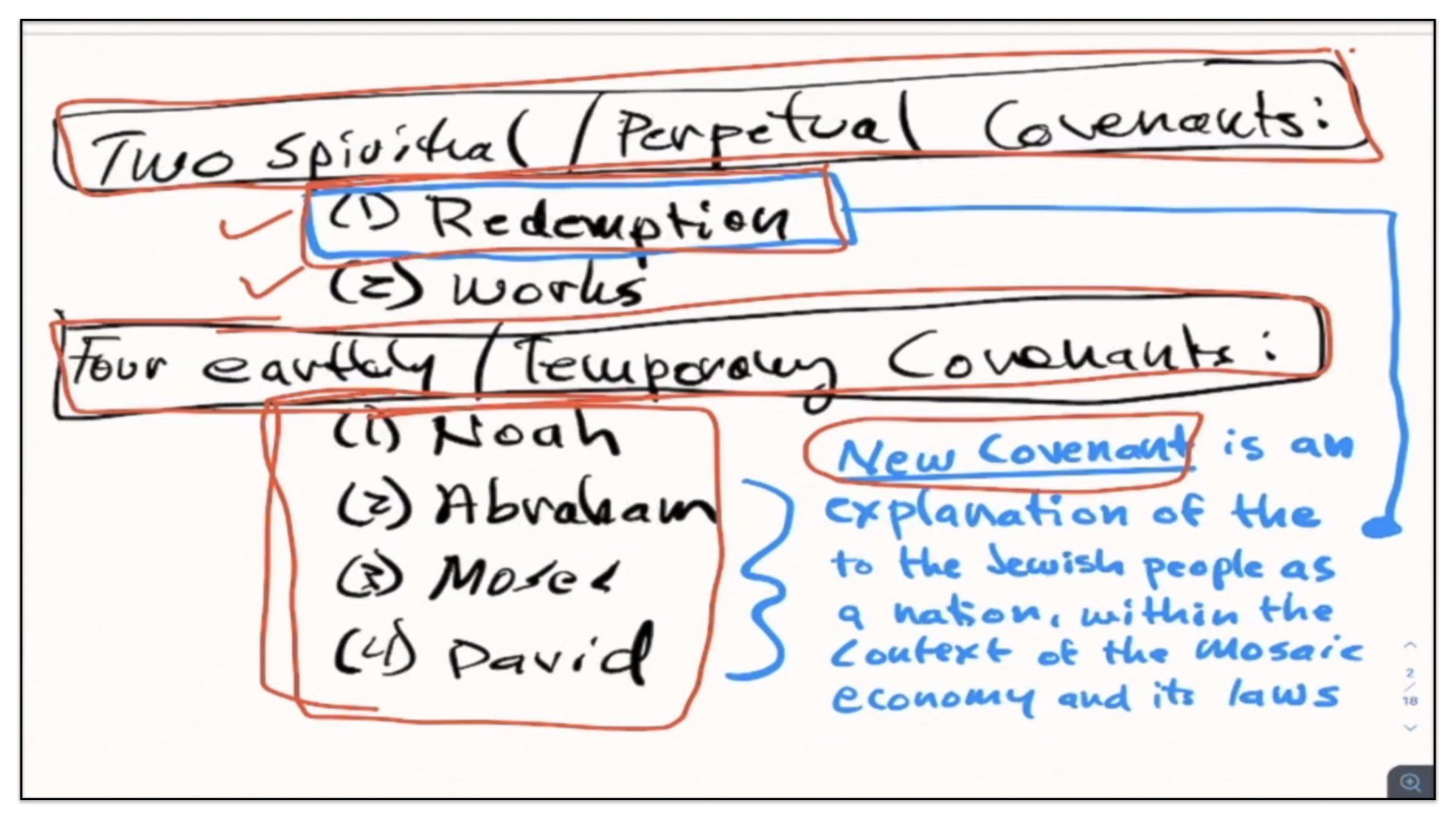
Now, you’ll remember from our previous studies, I believe the biblical covenants can be divided into two main categories. First, there are two spiritual and perpetual covenants—this would be the Covenant of Redemption and the Covenant of Works. And then secondly, there’s four earthly and temporary covenants— and these would be the Noahic, the Abrahamic, the Mosaic and the Davidic covenants. Then of course, there is the New Covenant. Now I don’t believe the New Covenant is an actual covenant, rather, I believe it’s an explanation to the Jewish people as a nation of the Covenant of Redemption within the context of the Mosaic economy and its laws.
A Summary Statement On What I Believe With Reference To The Earthly And Temporary Covenants
Now, in the last several weeks, we have been looking at the four earthly and temporary covenants and we’re going to continue looking at them in this study. In order to simplify, or at least clarify, my view on the subject, I’ve provided for you a written summary of my understanding and I’m going to read for you the first part of that summary, which will also serve as a review of what we’ve considered thus far.:
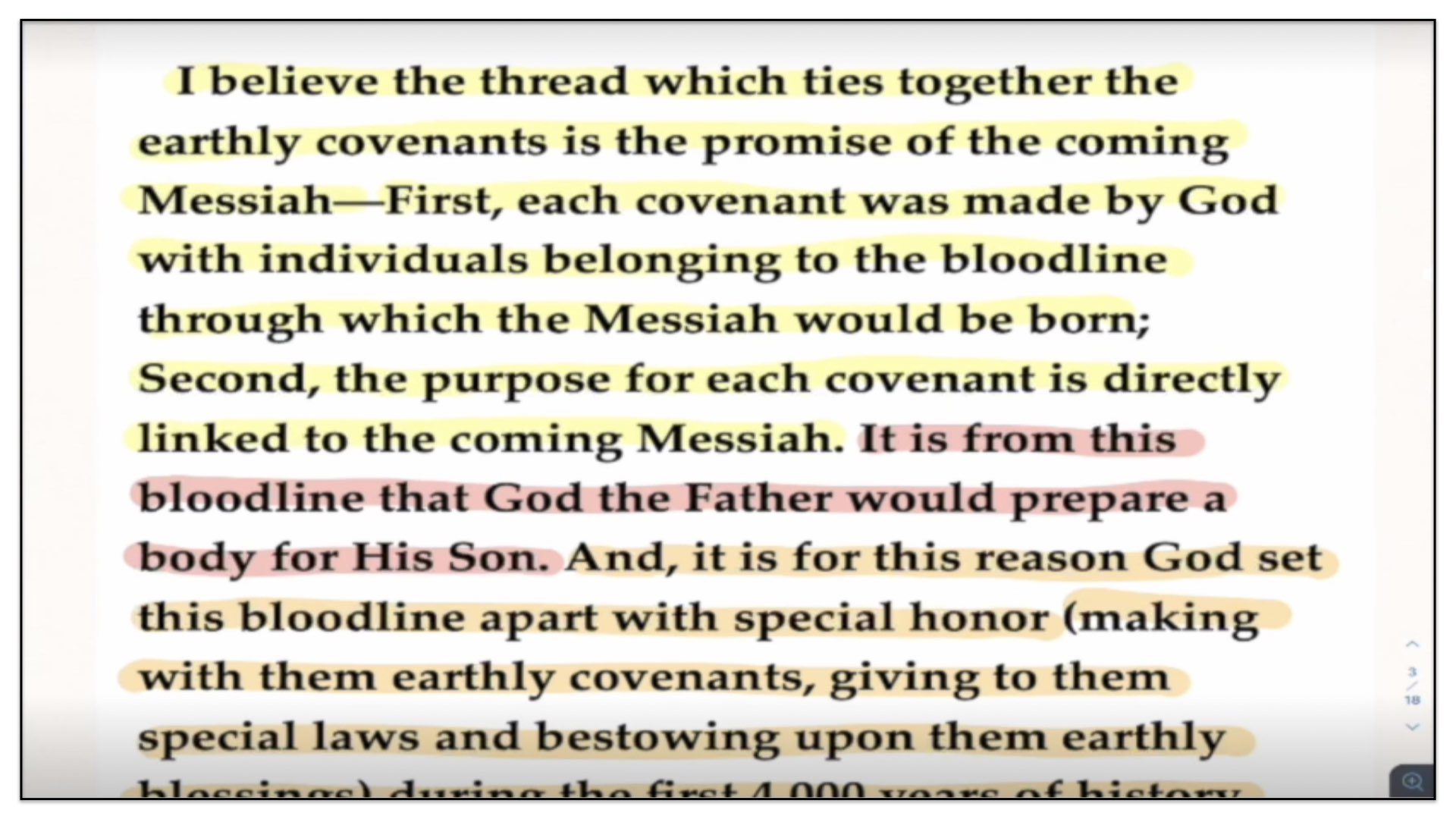
“I believe the thread which ties together the earthly covenants is the promise of the coming Messiah. First, each covenant was made by God with individuals belonging to the bloodline through which the Messiah would be born. Second, the purpose for each covenant is directly linked to the coming of the Messiah. It’s from this bloodline that God the Father would prepare a body for His Son.”
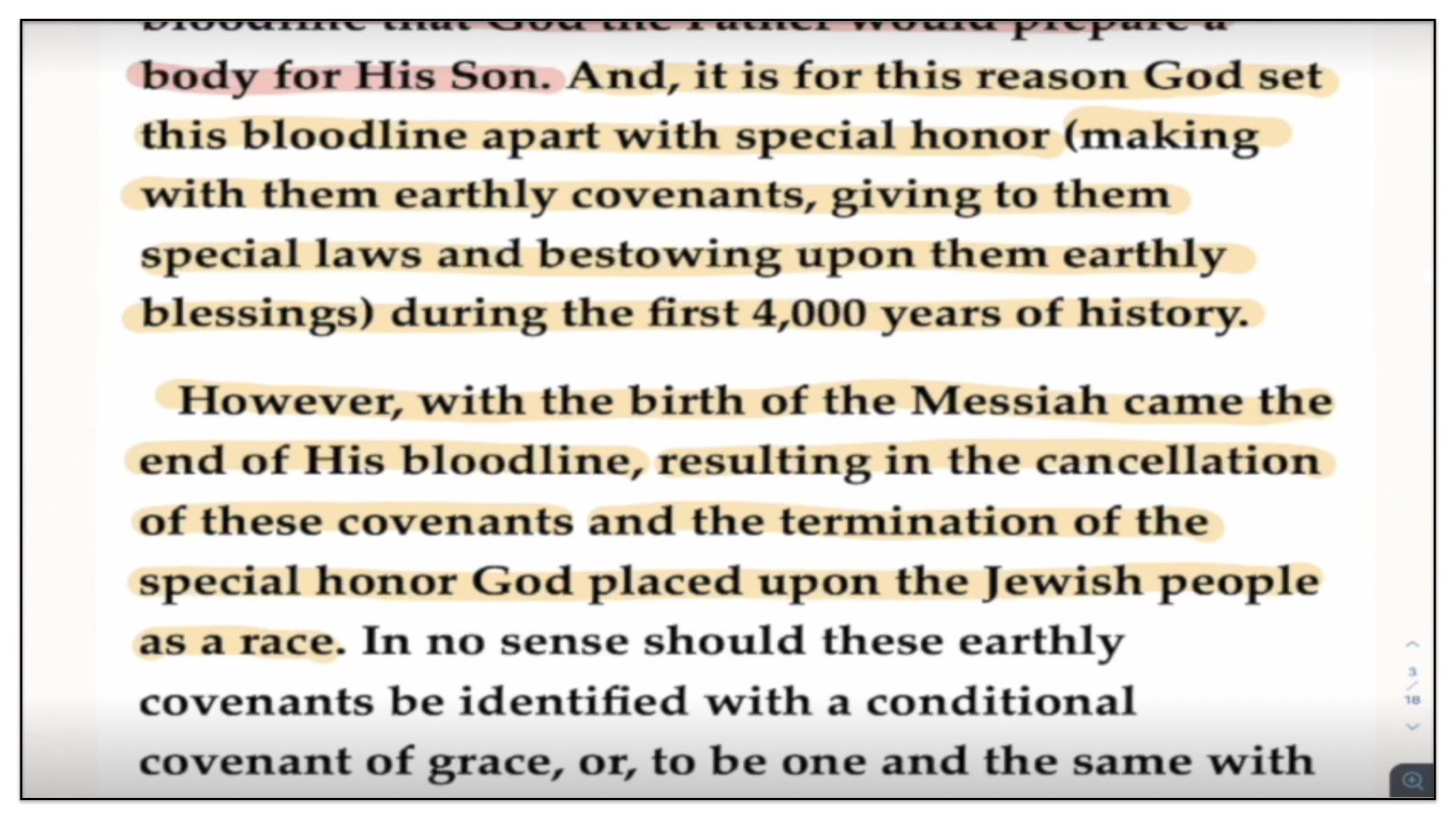
Now, last week we began looking at the statement that I’ve highlighted for you in orange, so let me continue reading from the statement:
“It’s for this reason God set this bloodline apart with special honor (making with them earthly covenants, giving to them special laws and bestowing upon them earthly blessings) all of which occurred during the first 4,000 years of history, prior to the birth of Christ. However, with the birth of the Messiah came the end of His bloodline, resulting in the cancellation of these covenants together with the termination of the special honor God placed upon the Jewish people as a race.”
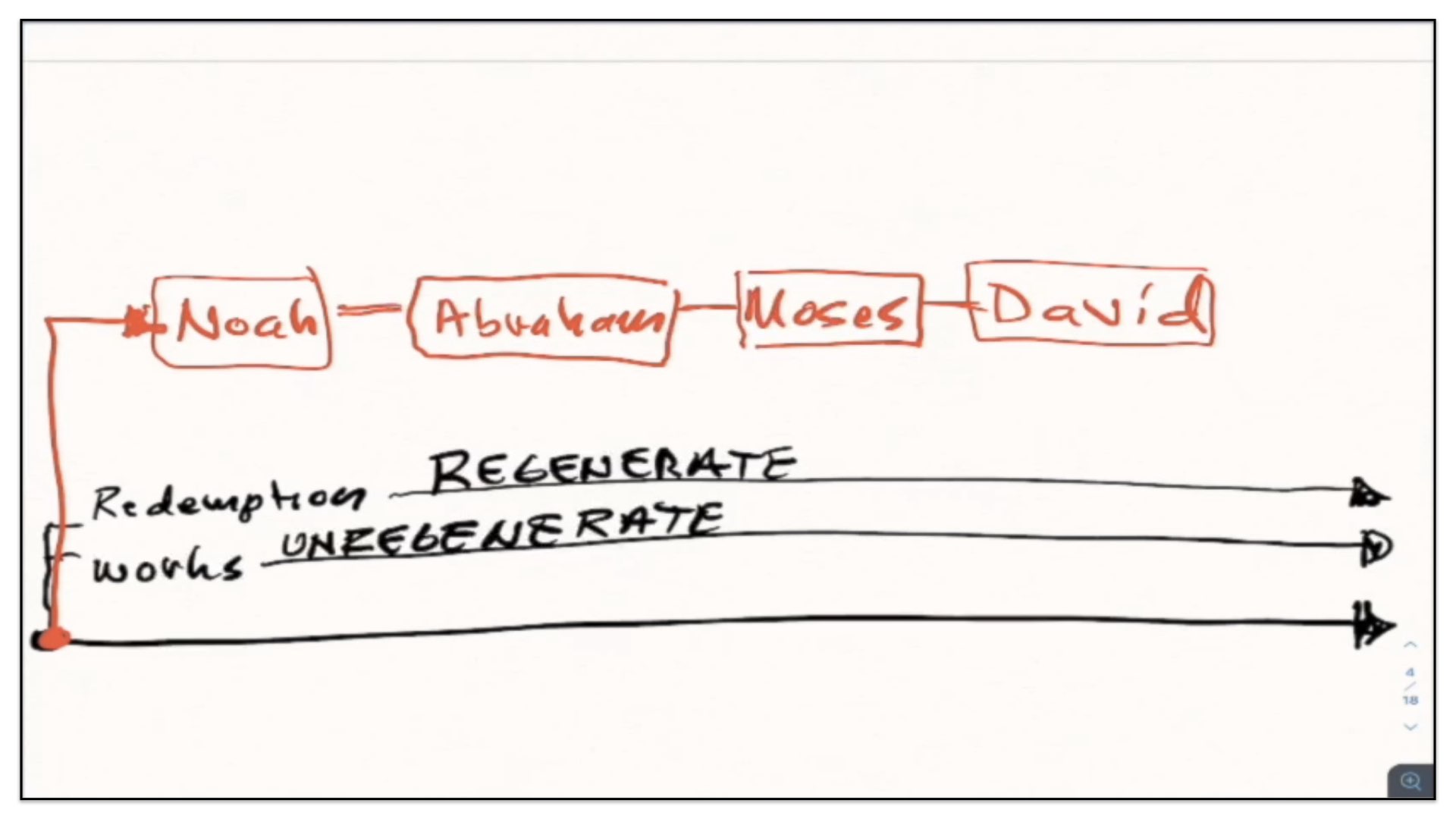
Now, we’re going to pick up in this study where we left off in the previous study. And just to refer you to the timeline, you’ll remember I focused in the previous study on the first of these earthly covenants—the covenant God made with Noah. And I pointed out to you that the Noahic Covenant has a termination point. When Christ returns, the second coming of the Messiah, the Noahic Covenant will cease to exist. So there is an endpoint to the Noahic Covenant, though at this particular stage in history, it is still active. All of us are still the recipients and the beneficiaries of the blessings God has placed under the terms of the Noahic Covenant.
Now, for this study we’re going to be looking at the final three major earthly covenant recorded in the scriptures, and this would be the covenants God made with Abraham, Moses and David.
The Earthly Covenants May Be Divided Into Two Major Sections Of History
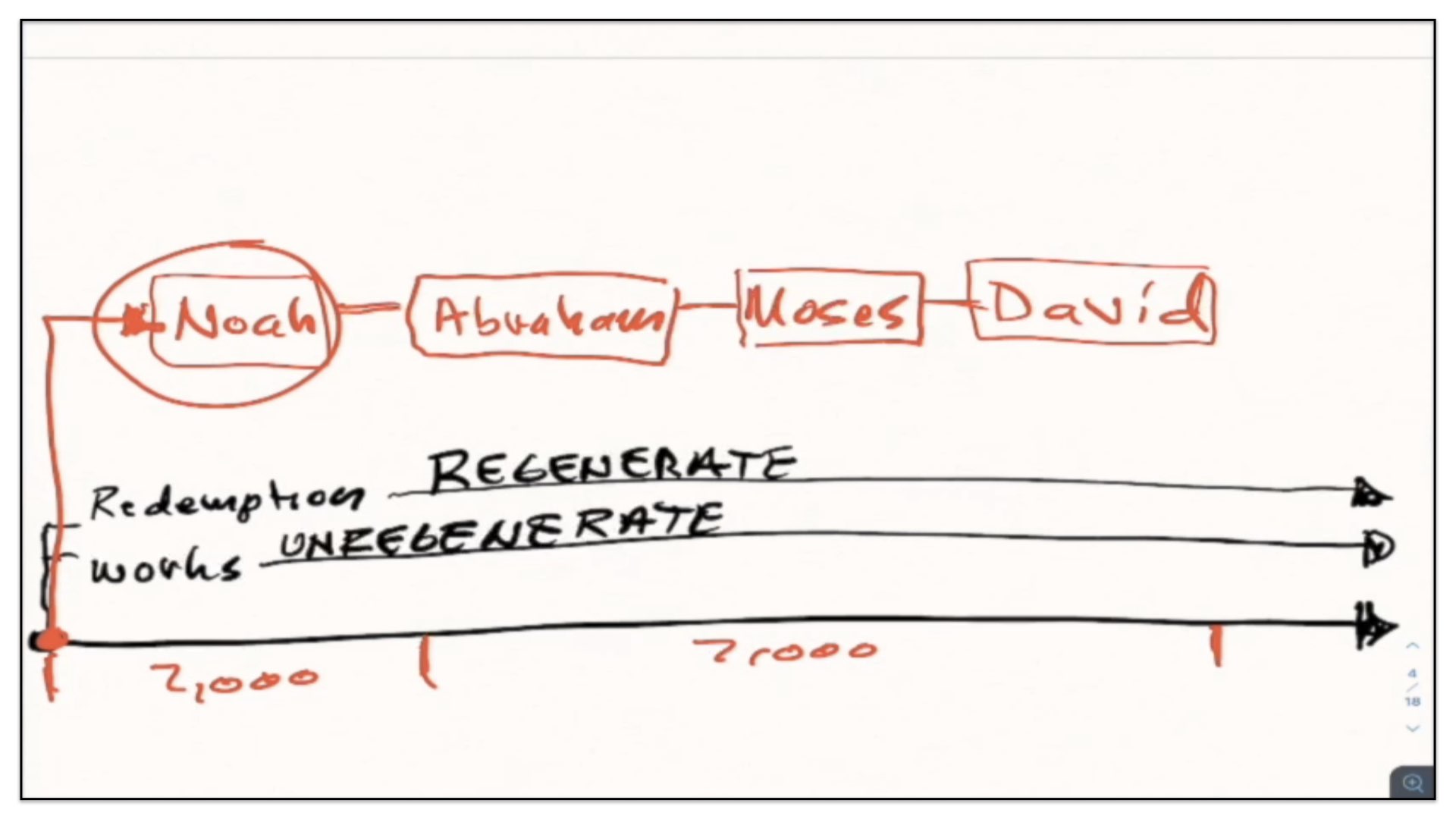
Now, let me just point out to you in general, you’ll remember last week, I divided the timeline into two main sections when dealing with these earthly covenants. The first section covers the first 2,000 years of history, and there’s only one covenant God made with the members of the Messiah’s family during those years. That’s the covenant God made with Noah. For the following 2,000 years, leading up to the birth of the Messiah, God made three more major covenants, or earthly covenants, with members of the Messiah’s family. These would be the covenants God made with Abraham, Moses and David.
The Connecting Points And Distinguishing Features Of The Abrahamic, Mosaic And Davidic Covenants
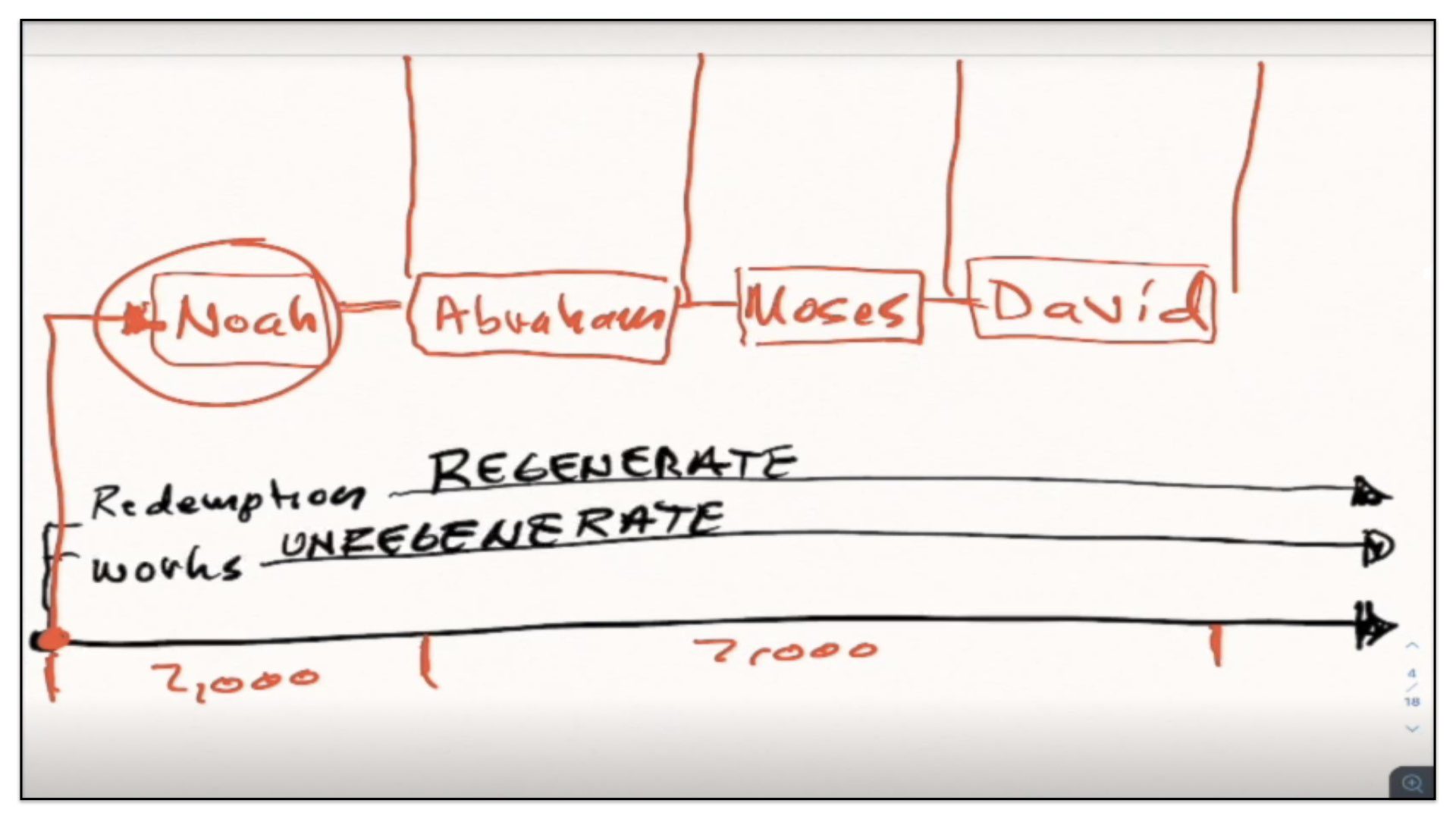
Now, let me highlight for you some interesting things in general about each of these three covenants, and I’m just going to separate them in these three divisions for you in the the on-screen notes.
The Abrahamic Covenant Was Personal, With A Racial Emphasis
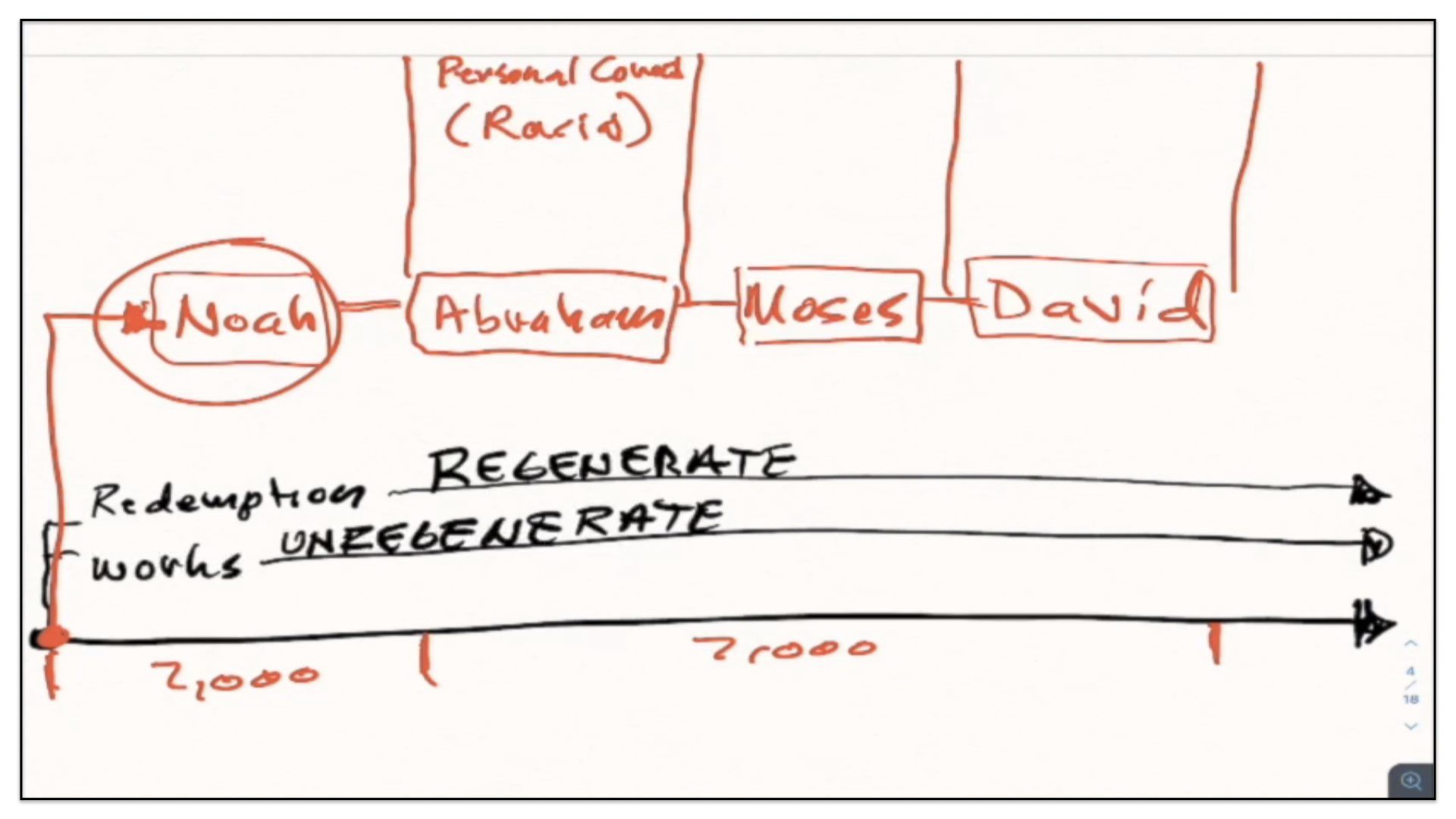
Beginning first with the covenant that God made with Abraham, the Abrahamic Covenant. I’d like you to notice, this was a personal covenant. A personal covenant that God made between Himself and Abraham, with special emphasis placed upon the Messiah’s racial bloodline. In other words, the Messiah would be born of the seed of Abraham. He would be a Hebrew or a Jew.
The Davidic Covenant Was Personal, With A Royal Emphasis
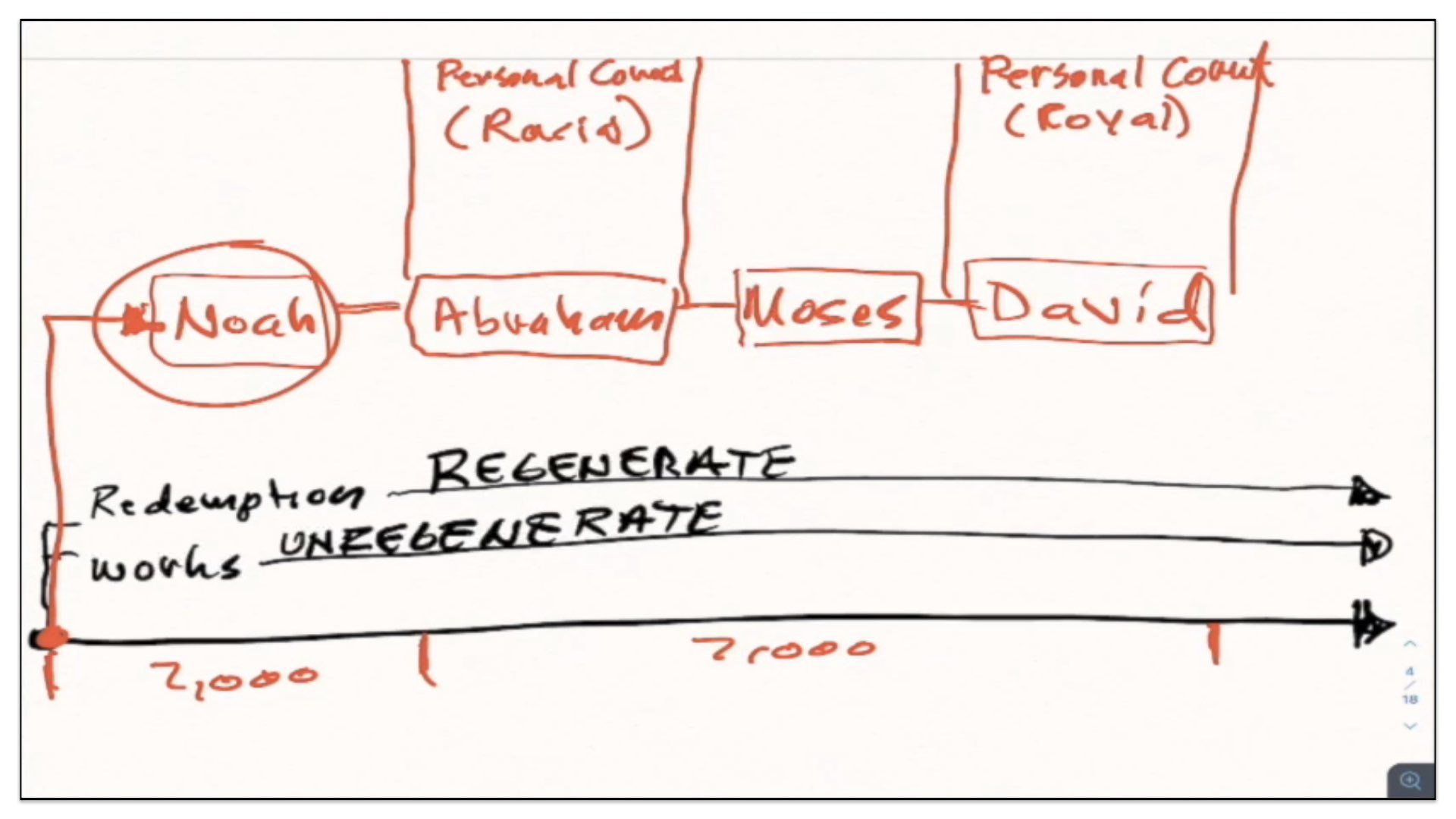
Likewise, when you take a look at the Davidic Covenant, this also was a personal covenant that God made between Himself and David. Only this time, the emphasis is not placed upon the racial bloodline of the Messiah, but rather, upon the royal bloodline of the Messiah. In other words, the Messiah would be born of the seed of David. He would be the King of kings and the Lord of lords. Now, you therefore see how the first and last of these three covenants link together. They were both personal in nature. One dealing with the racial aspect of the Messiah’s bloodline; the other dealing with the royal aspect of His bloodline.
The Mosaic Covenant Was National, With A National Emphasis
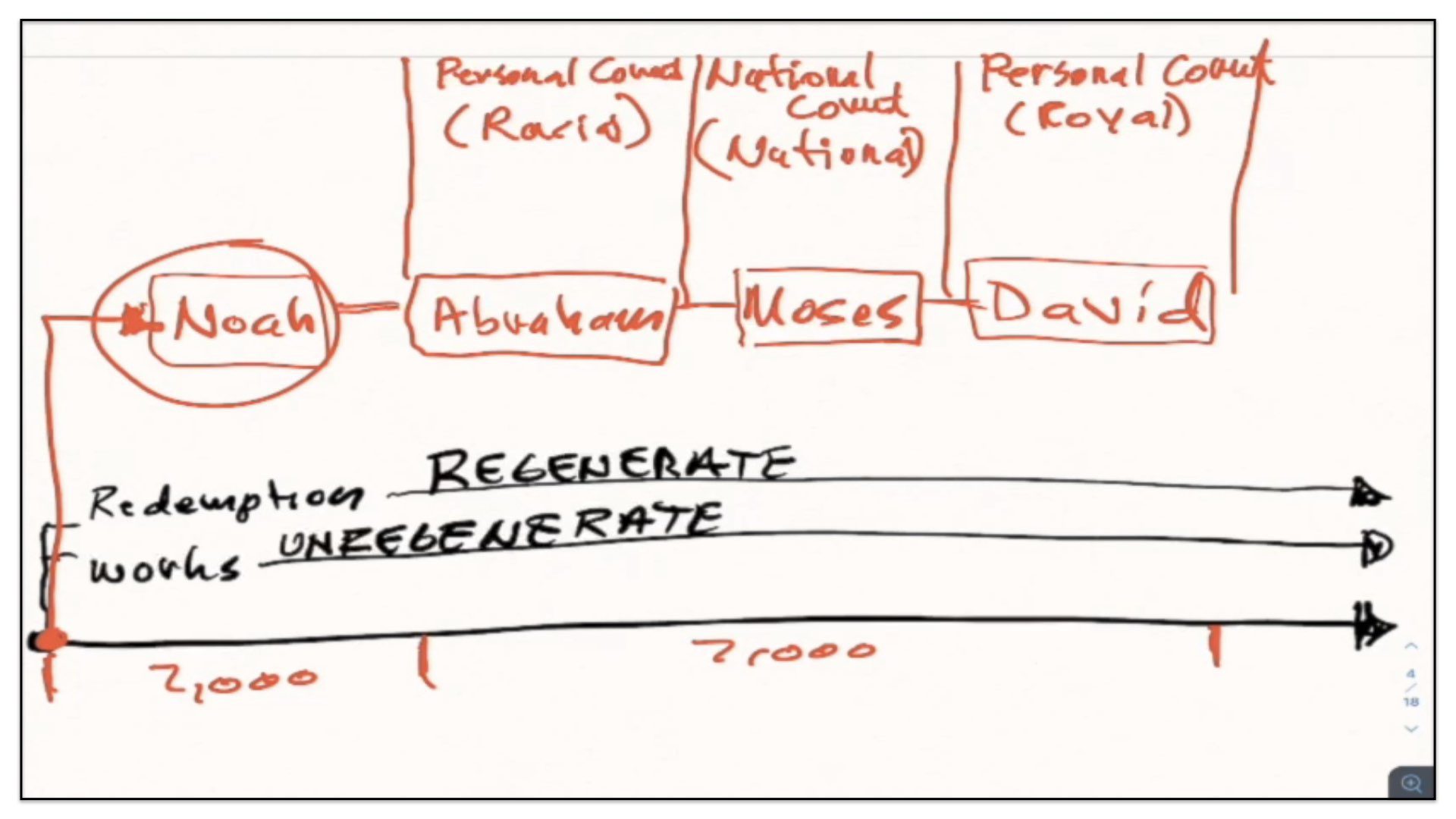
This then leaves us with the middle covenant, that God made with Moses. Now, the covenant God made with Moses was not personal. Rather, it was a national covenant. God made this covenant with Moses on behalf of the children of Israel as a nation. And the emphasis in this covenant is not placed so much upon the racial or royal aspects of the Messiah’s bloodline, but rather, it’s placed purely or squarely upon the national aspect of the Messiah’s bloodline. Meaning this, the Messiah belonged to the nation of Israel, and when He came into this world, He came into this world under the Mosaic economy and its laws. He was subject to the laws of Moses. Now, in general that’s how I would highlight for you the major movements of these three earthly covenants. And also, generally speaking, how they fit together as a whole.
The Abrahamic Covenant—Its Racial Emphasis On The Messiah’s Bloodline
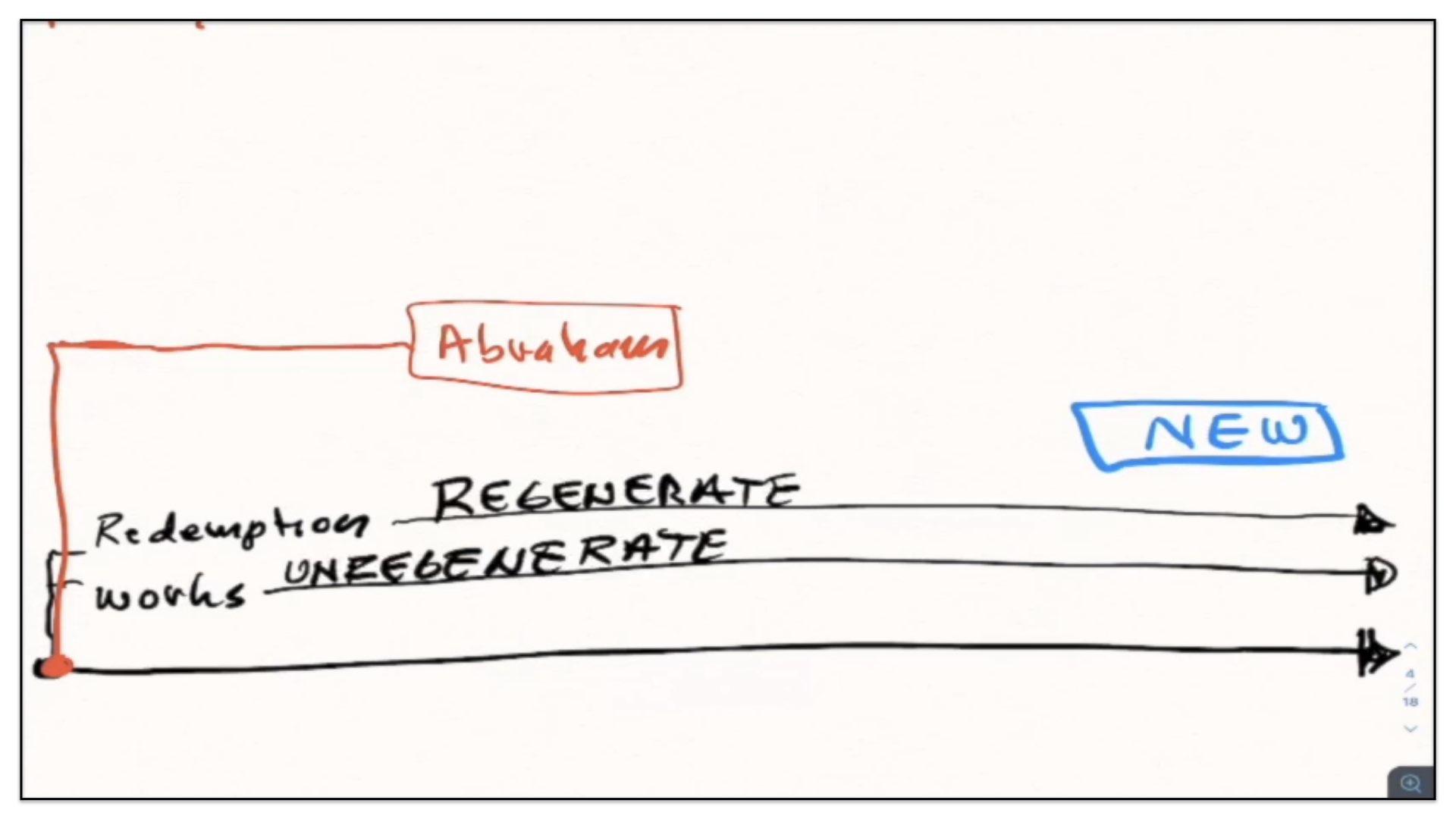
What I’d like to do now is take a closer look at each of these three covenants and we’re going to begin with the covenant God made with Abraham, this personal covenant that has a racial distinction with regards to the Messiah’s bloodline. Now, let me just take you down to a new timeline, so we have extra space I can make some further notes for you. We’re looking at the covenant God made with Abraham.
The Biblical Record—Genesis 12:1-3; 17:1-11
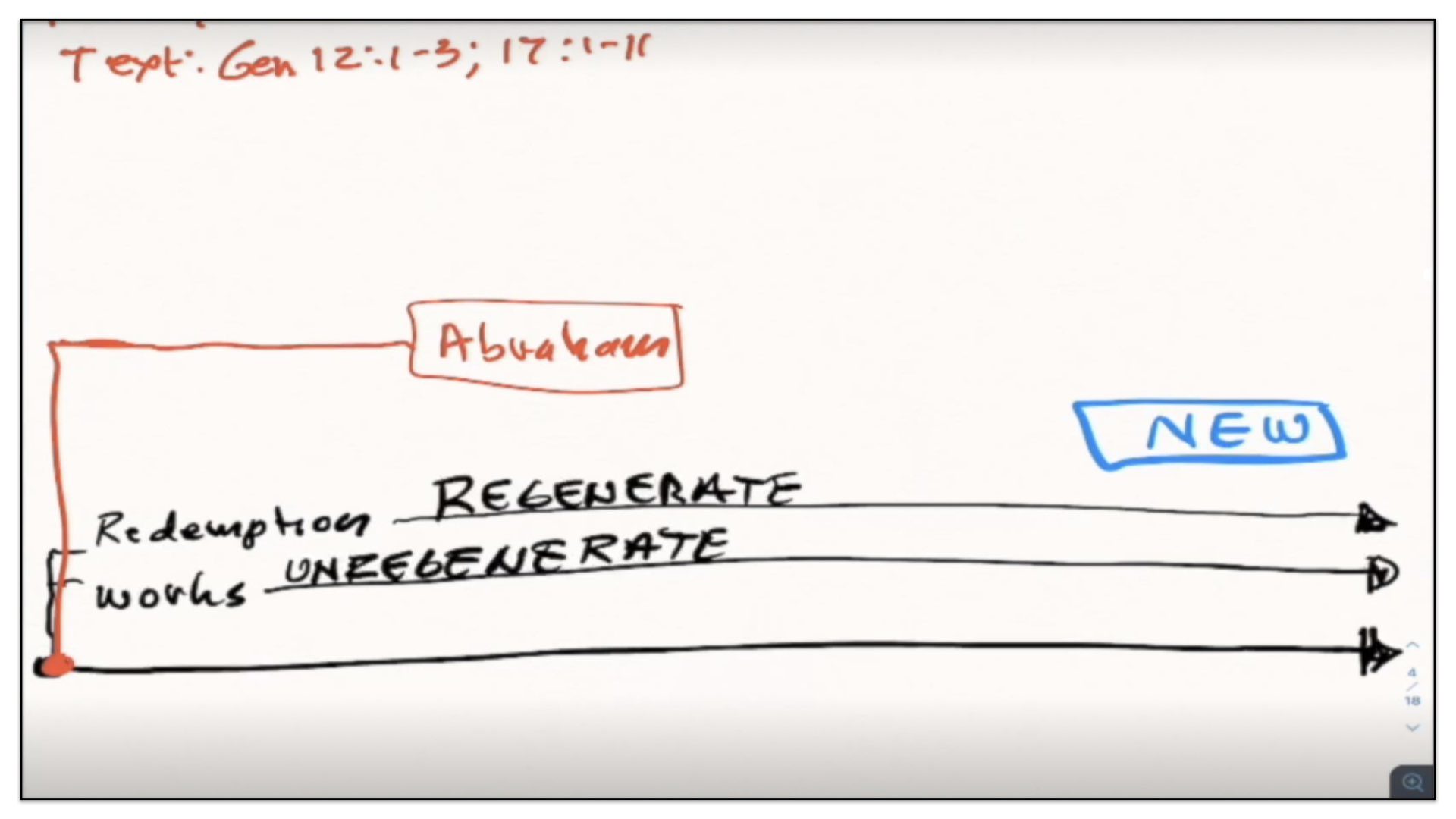
Where do we find this covenant recorded in the scriptures? Well, I guess we can just mark it down like this in our notes. The main text. There’s actually many passages in the book of Genesis which record different aspects of this covenant. To name a couple of them for you would be Genesis chapter 12 verses 1 through 3 and Genesis chapter 17 verses 1 through 11. Now, given our time restraints, I’m not going to read for you the texts for each of these earthly covenants. I’d like to encourage you this week to set aside some time where you can read these passages on your own. And I hope you’ll read them in light of the teachings I’m now giving to you in this study. But when you do read them, you’ll find these two passages of special note and I would refer you to them if you’re going to read up on the Abrahamic Covenant.
The Terms/Conditions—(1) Obedience To The Lord; (2) Circumcision Of Males

Now, having said this, I want to highlight for you a couple of things you’ll find in the text readings. First, you’ll find some terms, or conditions, placed upon this covenant. There’s a couple of them. The first of these conditions is that Abraham is commanded to walk in obedience with the Lord. That’s the first condition God places upon this covenant He makes with Abraham. Abraham is to walk before the Lord in obedience. And secondly, Abraham was to circumcise, or have circumcised, the various males in his household. And this is the introduction of circumcision which we read quite a bit about throughout the Old Testament scriptures and also the New. And those are the conditions placed upon this covenant.
The Promises/Blessings—(1) Given A Large Family; (2) Given A Large Land
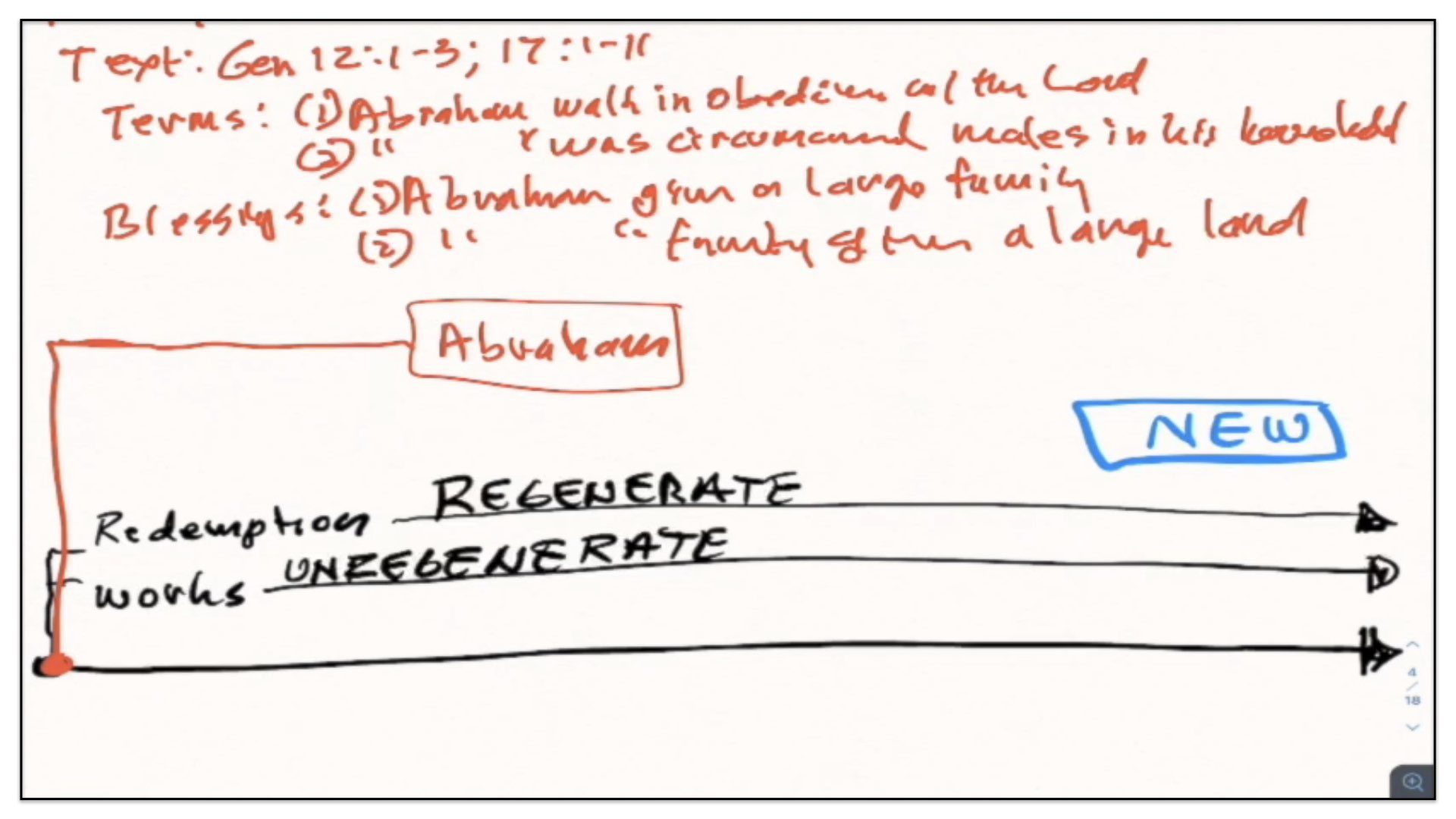
What about the blessings that are promised in this covenant? Well, under the blessings of this covenant God pledged to give two bestowments. First, Abraham would be given a large family. Now we read this in Genesis chapter 17 and verse 6. God said to Abraham, “And I will make thee exceeding fruitful, and I will make nations of thee, and kings shall come out of thee.” That’s the first promise God made to Abraham under this covenant. He would be given a large family. The second promise that God made under the blessings of this covenant—Abraham’s family would be given a large land in which to live. Now, we read of this in Genesis chapter 17 and verse 8. God told Abraham that He would give unto him and to his seed after him the land, wherein he was then a stranger, the land of Canaan. All the land of Canaan. And which would be given to him and his family as an everlasting possession. And God promised that He would be their God in that land. Now, these are the two terms and these are the two promises attached to the Abrahamic Covenant.
The Duration/Termination—It Ended With The Birth Of The Messiah
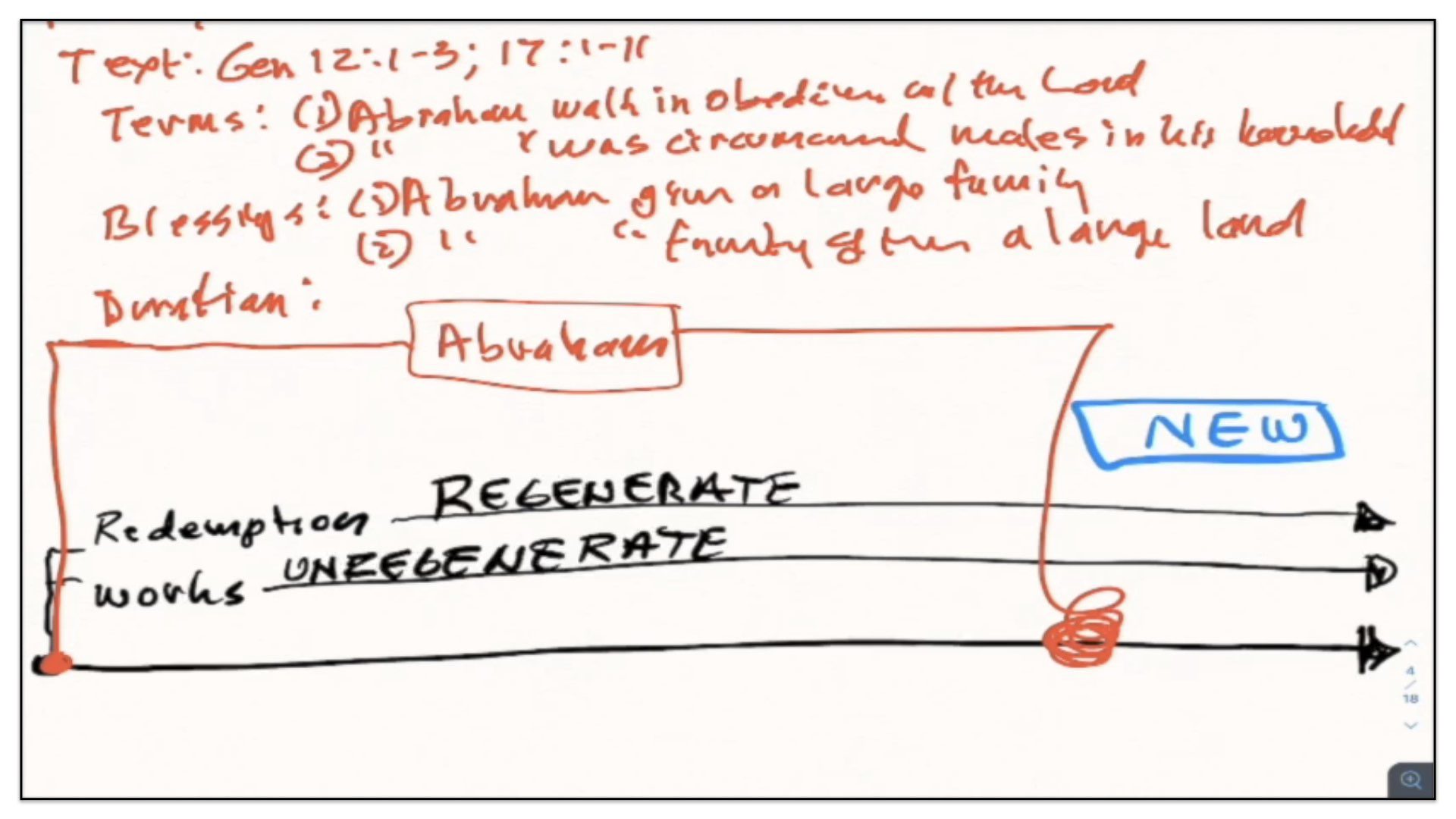
Let me now mention something about its duration. For how long did the Abrahamic Covenant last? Is it still ongoing today? Well, you’ll hear various views from those that you will listen to; the various preachers or the books that you’ll read. I take the view that the Abrahamic Covenant is not an everlasting covenant. It is not ongoing. Now, of course, think back to our study last week when I mentioned the Noahic Covenant is not an everlasting covenant. Yet in the book of Genesis, God identifies the Noahic Covenant as an everlasting covenant. But I pointed out to you, there’s two ways of understanding the word everlasting. The first way we understand it, and it’s how we usually interpret it, is that it’s ongoing with no absolute end; it’s forever. But the other way that the term could be used is within the context of a finished purpose. Once the purpose for which something has been set in motion has come to an end, then that thing finishes; it terminates. However, it will not end or terminate until it accomplishes its purpose. And that’s what I believe is true of the Abrahamic Covenant. The Abrahamic Covenant is called an everlasting covenant in Genesis chapter 17 and verse 7, only in the sense that God will not break the terms or promises of this covenant, until it accomplishes its purpose. But once that purpose has been accomplished, the covenant will come to an end. It will be terminated. Now, this of course I believe happened when the Messiah was born. For ultimately, that’s the main promise that God is making to Abraham in this covenant. The main promise is that he has been set apart, Abraham has been set apart, specially privileged by God because he belonged to the Messiah’s family. And all of Abraham’s descendants are going to be specially blessed on this earth, they’ll be a privileged people with great lands, a multiplied family, because they belong to the Messiah’s family. But once the Messiah is born, once He comes into this world, the bloodline of the Messiah will end, and therefore all of that honor God pours out upon the Messiah’s family leading up to His birth, it will then come to an end. And thus the Abrahamic Covenant will cease to function.
I believe we have a reference to this in Galatians chapter 3, and I’ll just turn to the passage for you. Galatians chapter 3 and let me read for you a few verses from the chapter, beginning in verse 15. The Apostle Paul wrote, “Brethren, I speak after the manner of men; though it be but a man’s covenant, yet if it be confirmed, no man disannulleth, or addeth thereto. Now to Abraham and his seed were the promises made. He saith not, And to seeds, as of many; but as of one, And to thy seed, which is Christ. And this I say, that the covenant, that was confirmed before of God in Christ, the law, which was four hundred and thirty years after, cannot disannul, that it should make the promise of none effect. For if the inheritance be of the law, it is no more of promise: but God gave it to Abraham by promise.” Now you see, if you were to study through the passage my dear friends, I believe you’ll find this covenant God made with Abraham pointed directly to the first coming of Christ—the seed of Abraham, who is Christ. At which time, when Christ came, this covenant God made with Abraham came to an end with the birth of the Messiah.
Well, that’s what I have to say to you in general about the Abrahamic Covenant. It’s really not complex. It’s not complicated; not difficult to understand; quite simple.
The Mosaic Covenant—Its National Emphasis On The Messiah’s Bloodline
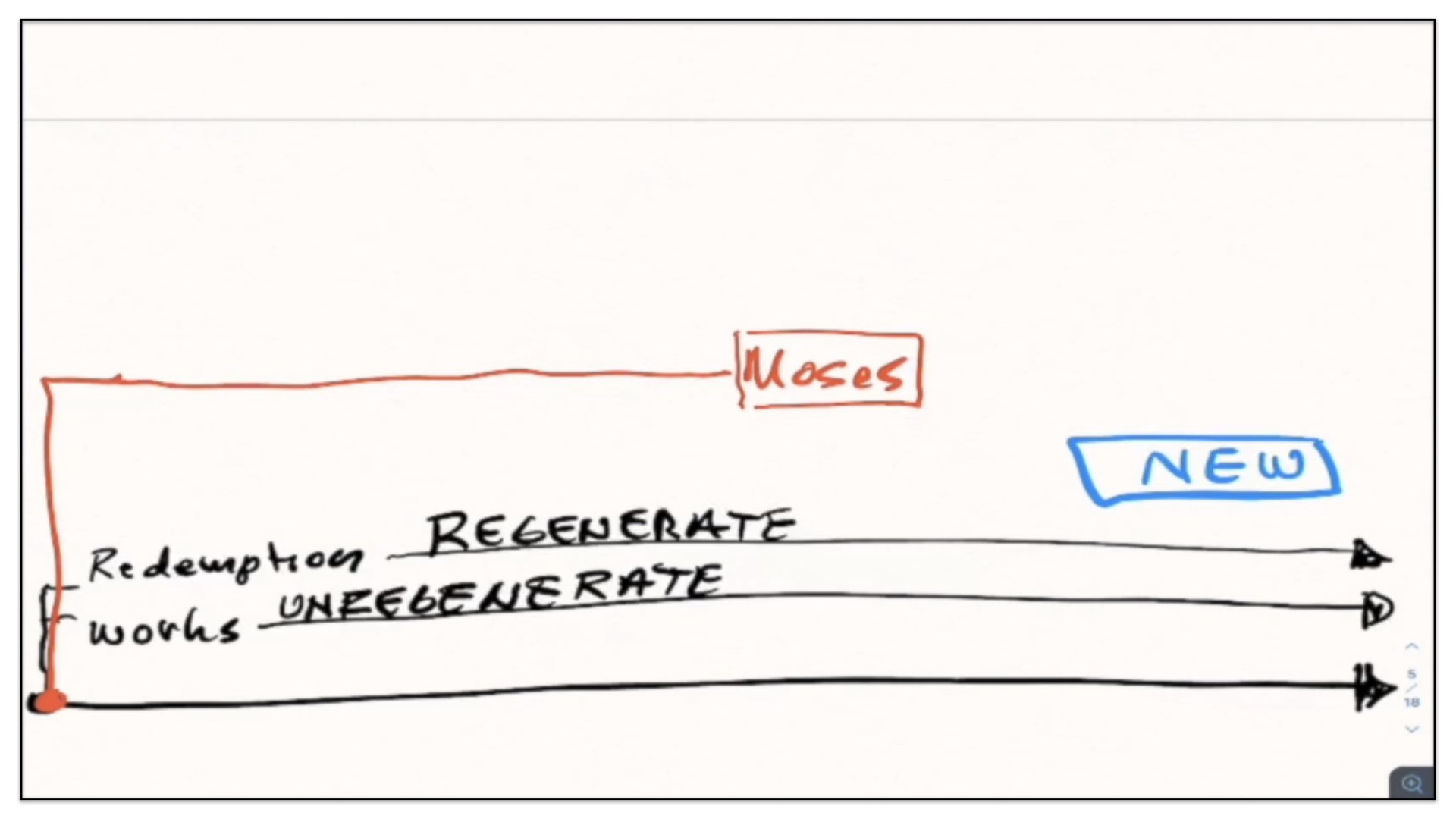
Now, given the information that I’ve provided for you on the Abrahamic Covenant, I’m now going to refer you to the next of these covenants, which is the Mosaic Covenant, and the Mosaic Covenant is built on what we’ve just considered concerning the Abrahamic Covenant. God has made these promises of richly blessing the Messiah’s family through Abraham’s family. Four hundred and thirty years later, Abraham’s family has turned into a nation, and God is going to constitute them a nation, under this covenant He makes with Moses on their behalf. Now, let me highlight a few things about this covenant.
The Biblical Record—Exodus 19-24; Deuteronomy 5-7
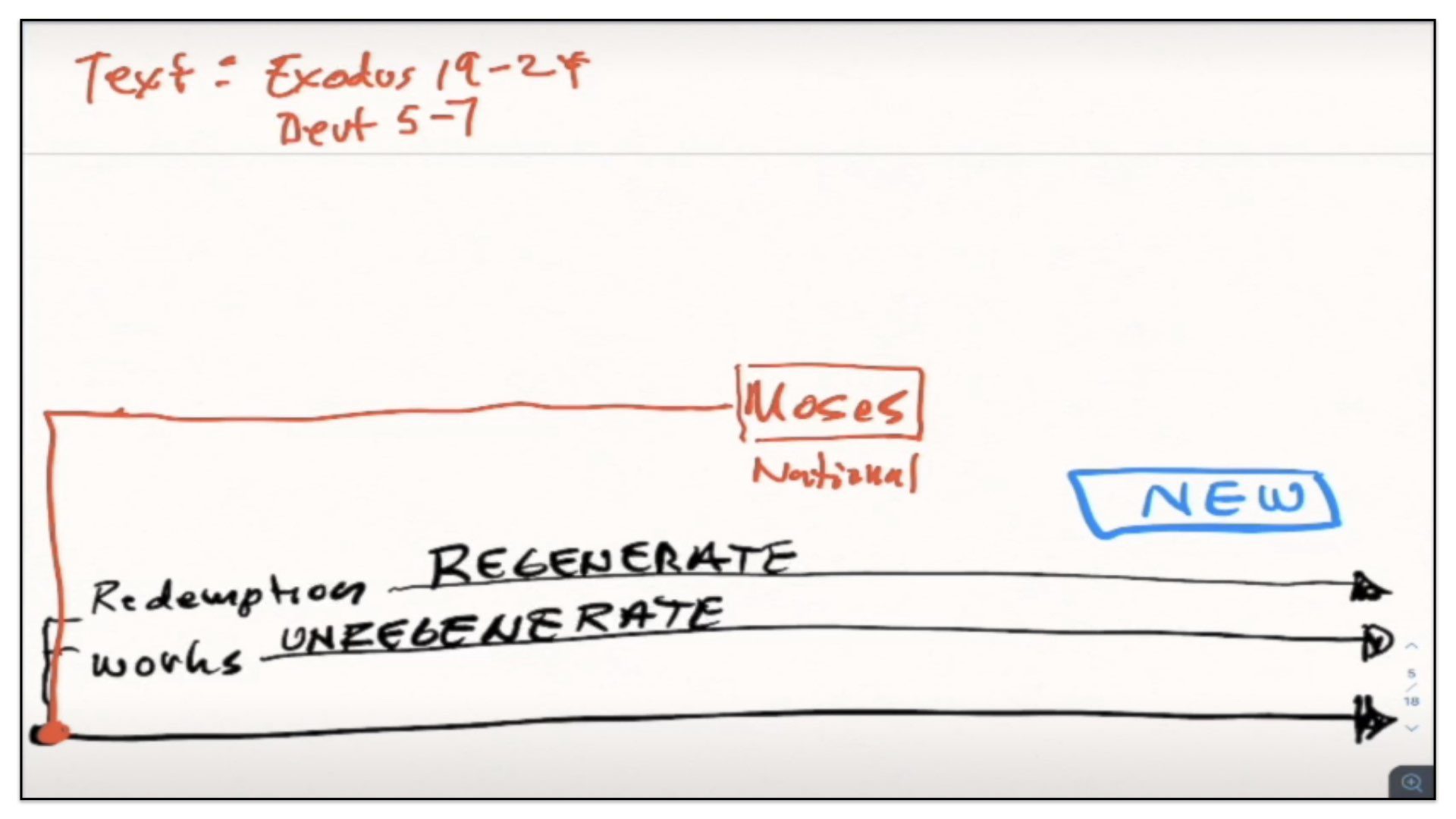
First, the text. Where do we find the Mosaic Covenant recorded? It’s in several passages of the Old Testament. Two of them I’ll refer you to and I hope you’ll read them this week. The first of these is Exodus chapters 19 through 24. It’s a much longer passage than the covenant recorded in Genesis regarding that God made with Abraham. That’s Exodus chapters 19 through 24. The other passage I’ll refer you to is Deuteronomy chapters 5 through 7. Now remember, this covenant God made with Moses is not a personal covenant. It’s a national covenant, on behalf of the Jewish people as a nation.
The Terms/Conditions—(1) Moral Law; (2) Civil Law; (3) Ceremonial Law
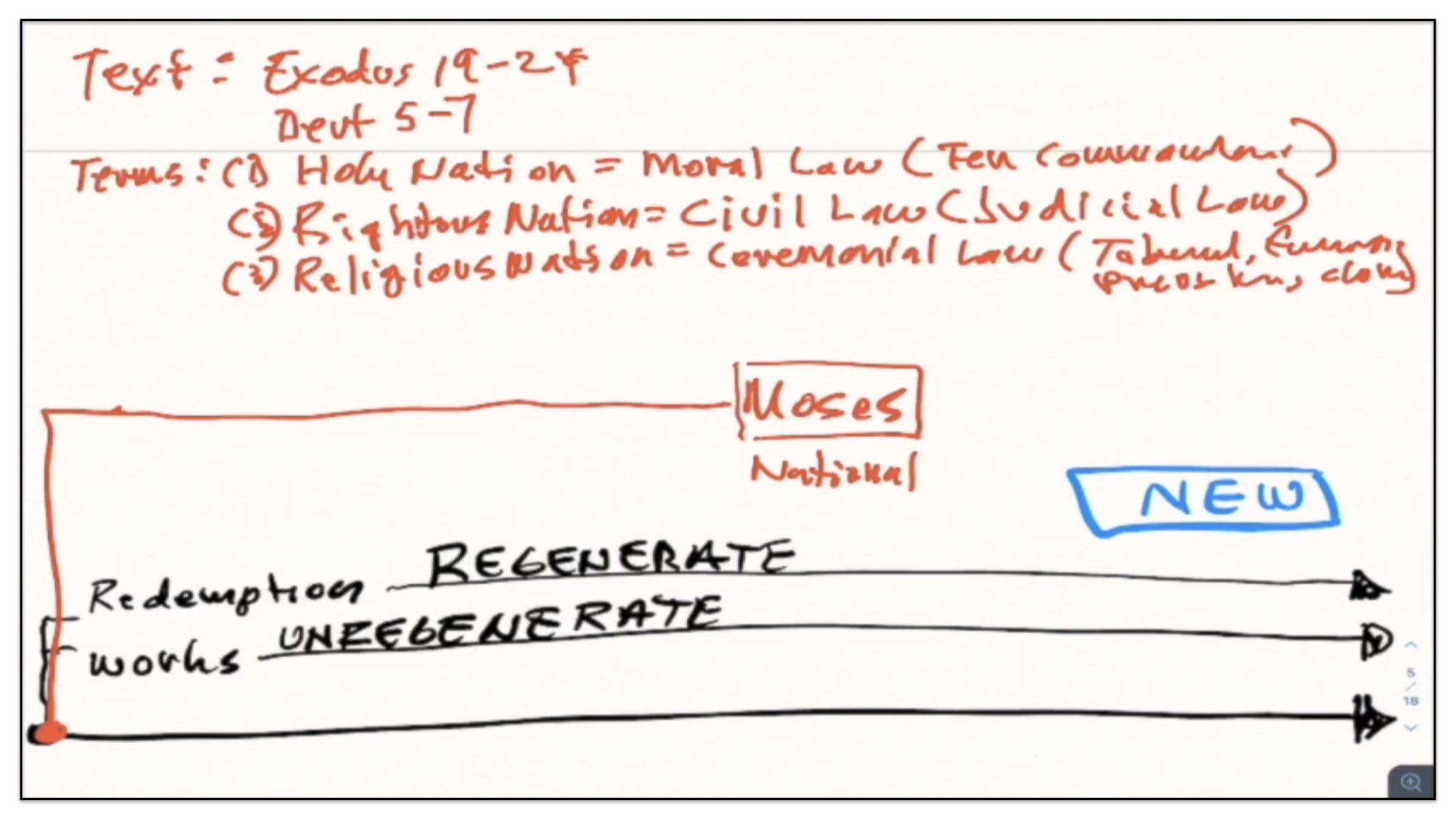
Now let’s consider for a few moments the terms of this covenant. What are the conditions of this covenant? Well, God gave a threefold law under the conditions, or terms, of this covenant. However, this threefold law is actually identified in scripture as a single law. When the scriptures speak about the law, especially as you read through the New Testament scriptures, it’s referring to all three branches of this law God gave to the children of Israel through Moses. But we tend to distinguish this single law under three headings and let me highlight them for you. This isn’t new information as I highlight them. You should be familiar with these branches of the Mosaic law.
Watch this. Since God appointed the Jewish people to be a holy nation, so God gave to them a moral law, otherwise known as the Ten Commandments. Secondly, because God created the nation of Israel to be a righteous nation, He gave to them a civil law, otherwise known as the judicial law of the people. And thirdly, because God created the nation of Israel to be a religious nation, He gave to them a ceremonial law, and that of course is where you get the teachings on the tabernacle, the furnishings, the priesthood, the clothings, the various sacrifices and ceremonies, etc. All of that falls under the ceremonial law. And these are the terms, you see, of the Mosaic Covenant. This is what was required of the Jewish people as a nation to follow to obey. Well, those are the terms.
The Promises/Blessings—A Land Which Flows With Milk And Honey
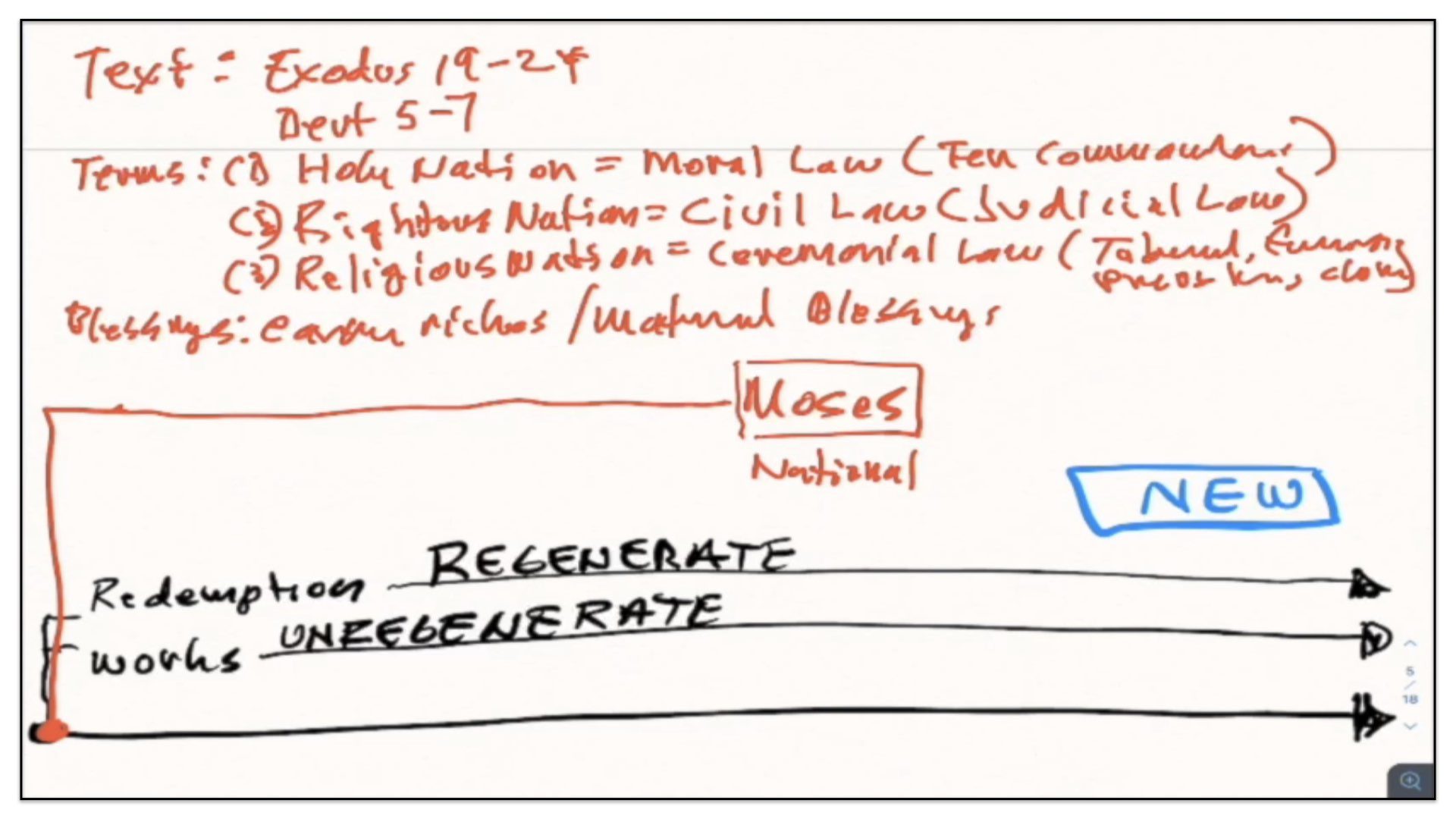
Let’s for a few moments consider the blessings of this covenant. What blessings did God promise under this covenant? Well, God pledged or promised to bestow upon the Jewish people as a nation great earthly riches and material blessings. A land which flows with milk and honey, the land of Canaan. Of course, these riches and material blessings were given to the Jewish people as a nation during the ebb and flow of the people’s obedience and disobedience towards God. You’ll remember, throughout the narrative of the Old Testament, when the children of Israel honored God, God would honor them. But when they dishonored God, God would bring dishonor upon them. And you see, this was a cycle that repeated itself throughout the history of the Jewish nation. Nevertheless, it can’t be denied that the Jewish people as a nation, even when God was bringing upon them chastisement, the Jewish people as a nation witnessed greater miracles and received richer earthly blessings than any other nation in history. God did richly bless them. That’s the blessings God promised upon them.
The Duration/Termination—It Ended With The Birth Of The Messiah
Now, what about the duration? For how long does or did the Mosaic Covenant last? Well, just as I’ve explained about the Abrahamic Covenant, I believe the Mosaic Covenant is not an everlasting covenant. Of course, there are passages in the Old Testament which referred to it as an everlasting covenant. But I believe it’s only everlasting in the sense that the covenant will continue only as long as needed, and once God accomplishes the purpose for which He has established the Mosaic Covenant, then the covenant will be terminated.
The Mosaic Covenant Continued Until The Purpose For Its Existence Was Fulfilled
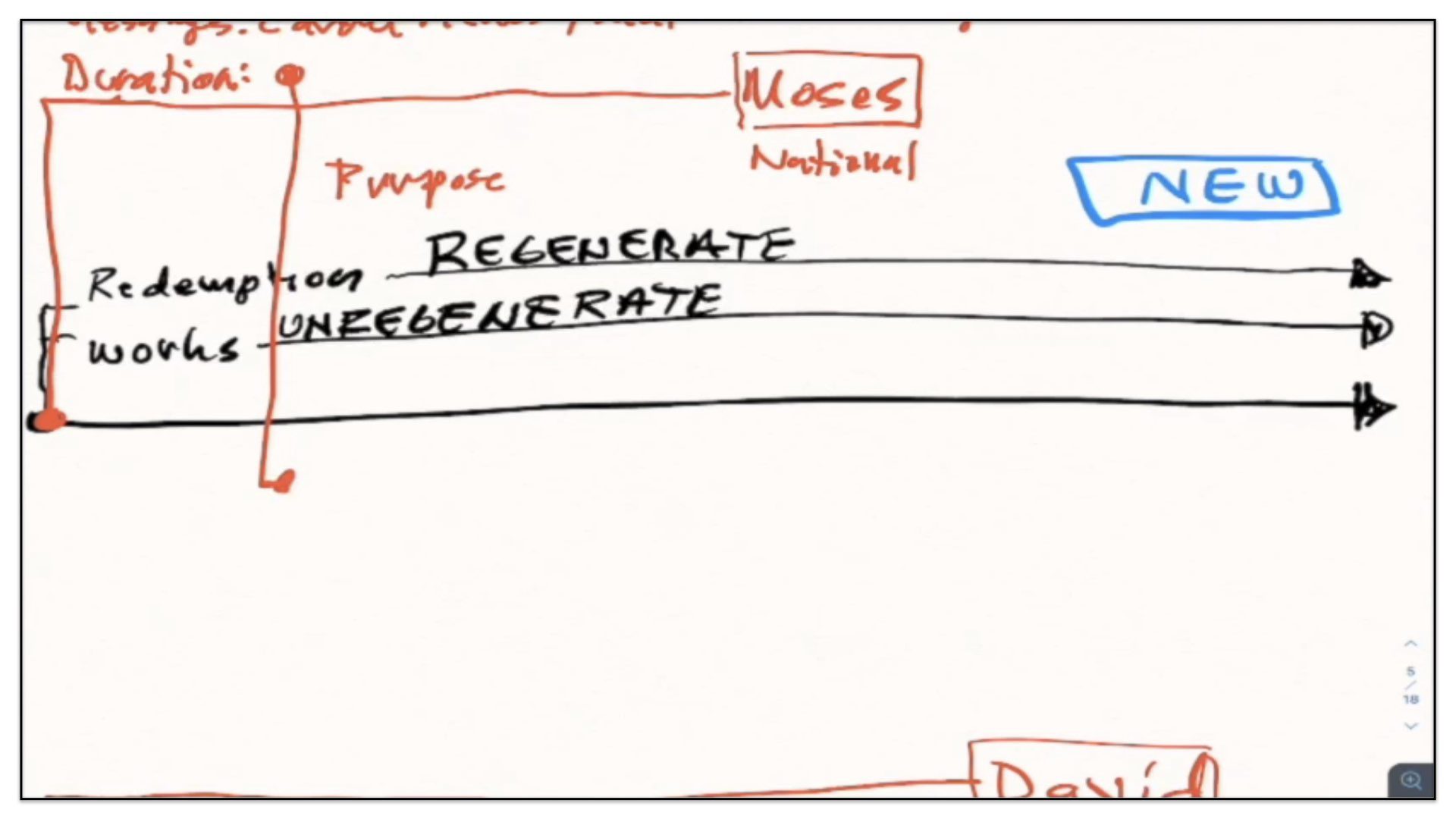
Well, that brings us to ask the important question—What is God’s purpose on establishing the Mosaic Covenant with Moses on behalf of the children of Israel as a nation? Well, to answer this, and I do want to give you a few answers to this, I’ve got four in mind. Four reasons God established the Mosaic Covenant. I’m gonna highlight them for you just under the timeline. So let me bring it down here, and we’re talking about now the purpose for which God has established the Mosaic Covenant.
First Purpose—The Jewish People As A Nation Were To Be The Bloodline Through Which The Messiah Would Be Born
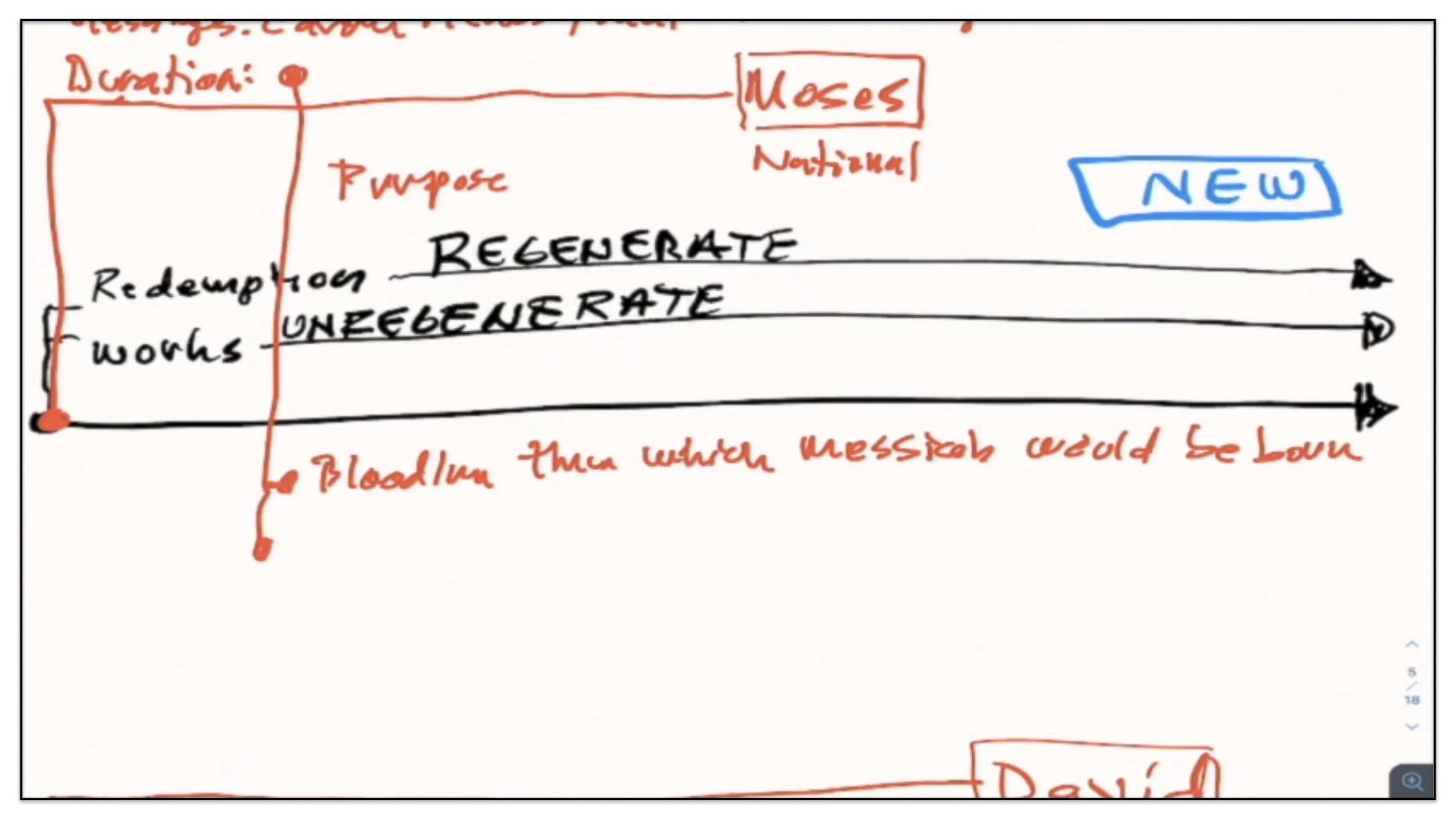
The first of these purposes, watch, the Jewish people as a nation were to be the bloodline through which the Messiah would be born. That’s the first purpose for which God established the Mosaic Covenant. It was this family through which the Messiah would be born. And that’s ultimately—what I’ve been arguing in this whole series of studies on the earthly covenants—that’s ultimately why all of these covenants have been established by God, these earthly covenants, and why God is honoring the Jewish people as a race.
Second Purpose—The Jewish People As A Nation Were To Be The Repository For The Old Testament Scriptures
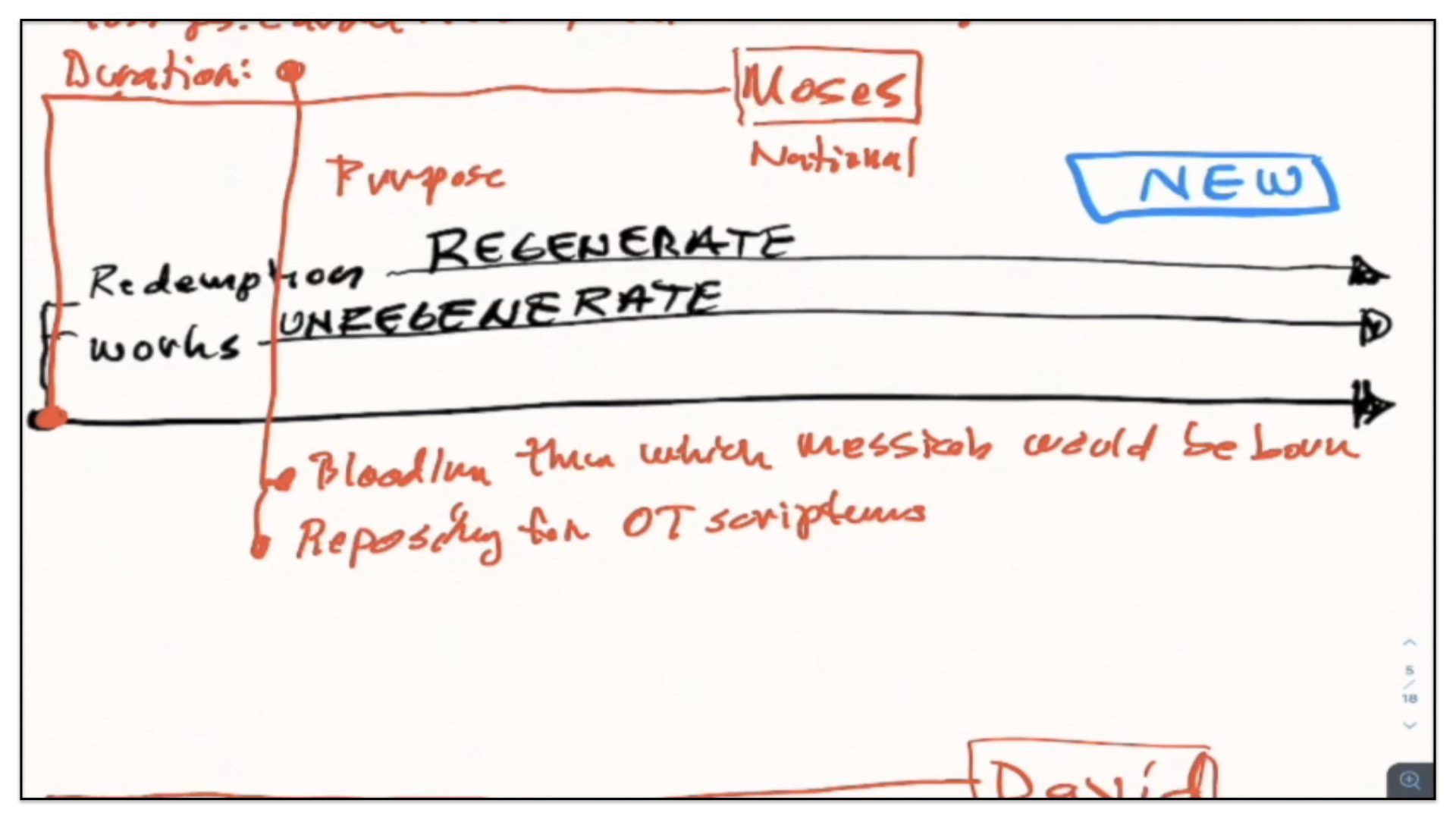
But there’s a second reason God established the Mosaic Covenant—the Jewish people as a nation were to also be the repository for the Old Testament scriptures. Now remember, it was Moses—the one with whom God made this Covenant on behalf of the Jewish people as a nation—Moses gave us the first five books of the Bible, the books of the Law. And when these books were written, they were placed near or in the ark of the covenant, in the tabernacle, they were preserved. And throughout the course of the Jewish people as a nation, God would raise up prophets and some of those prophets would add to the canon of the Old Testament scriptures. They are all inspired writings and when an inspired document was completed it would be added to the collection of the sacred writings. And part of God’s purpose on creating this nation and establishing the tabernacle, later the temple, and creating the priesthood, and the prophets, and and the scribes was that they might write and then preserve the Old Testament scriptures. That’s a second purpose.
Third Purpose—The Jewish People As A Nation Were To Serve As A House Of Gospel Witness
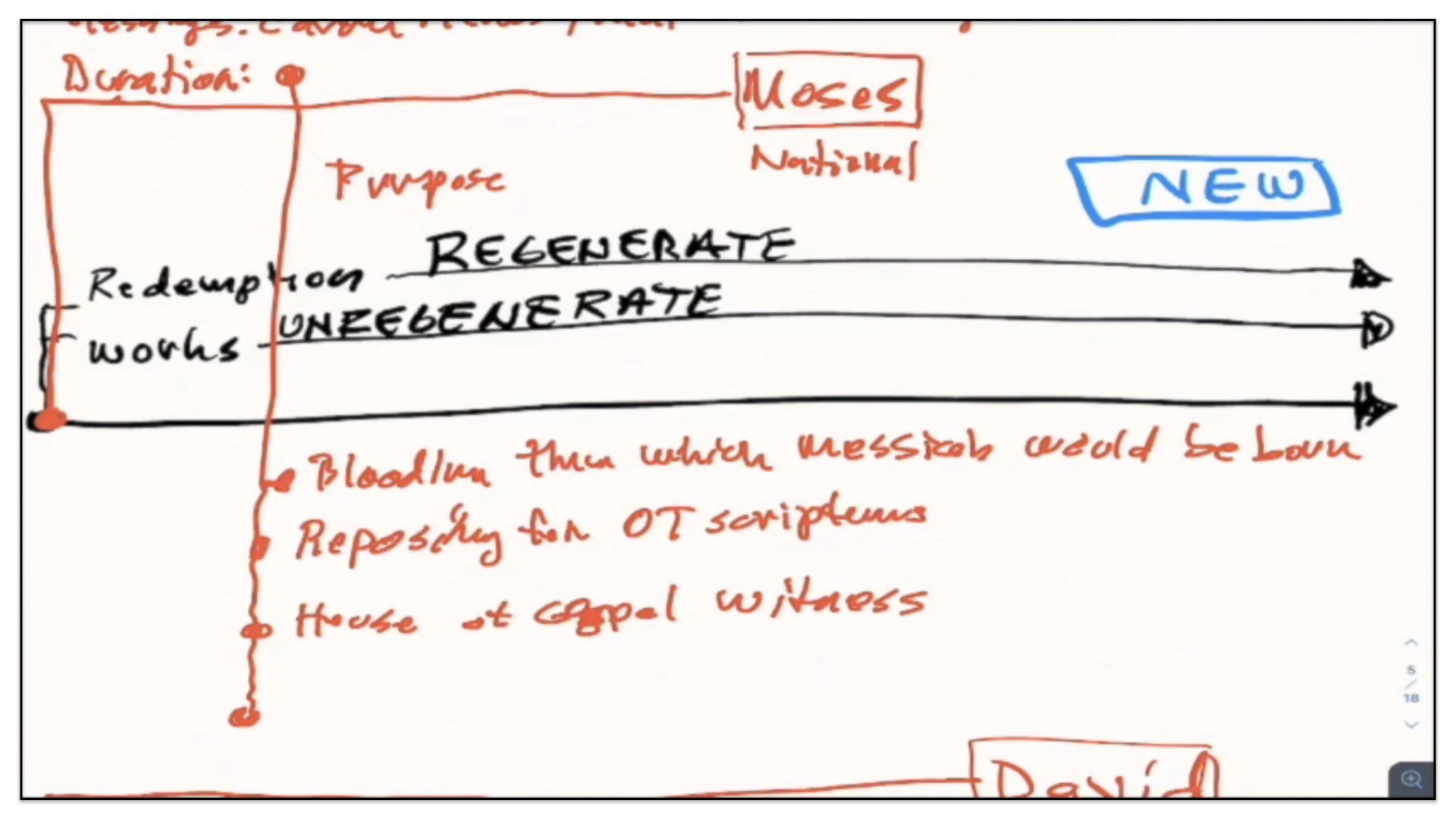
There’s a third purpose why God established the Mosaic Covenant—the Jewish people as a nation were to serve as a house of gospel witness. A house of gospel witness. And this is found under the ceremonial law. Remember, God established the Jewish people to be a religious nation. That doesn’t mean that every person belonging to the law of Moses was saved spiritually. But speaking purely on religious terms, natural religion if you like, God established the nation of Israel to be religious. To not worship idols, to believe in the one true and living God, the Creator of heaven and earth. And then God gave to them as a nation a house of gospel witness and that came in the object lesson of the tabernacle and its furnishings and the priesthood and their clothings and the sacrifices and the ceremonies. That was a house of gospel witness. It pointed as a signpost to the Covenant of Redemption.
Fourth Purpose—The Jewish People As A Nation Were To Serve As An Object Lesson For The Covenant Of Redemption And God’s Spiritually Elect People
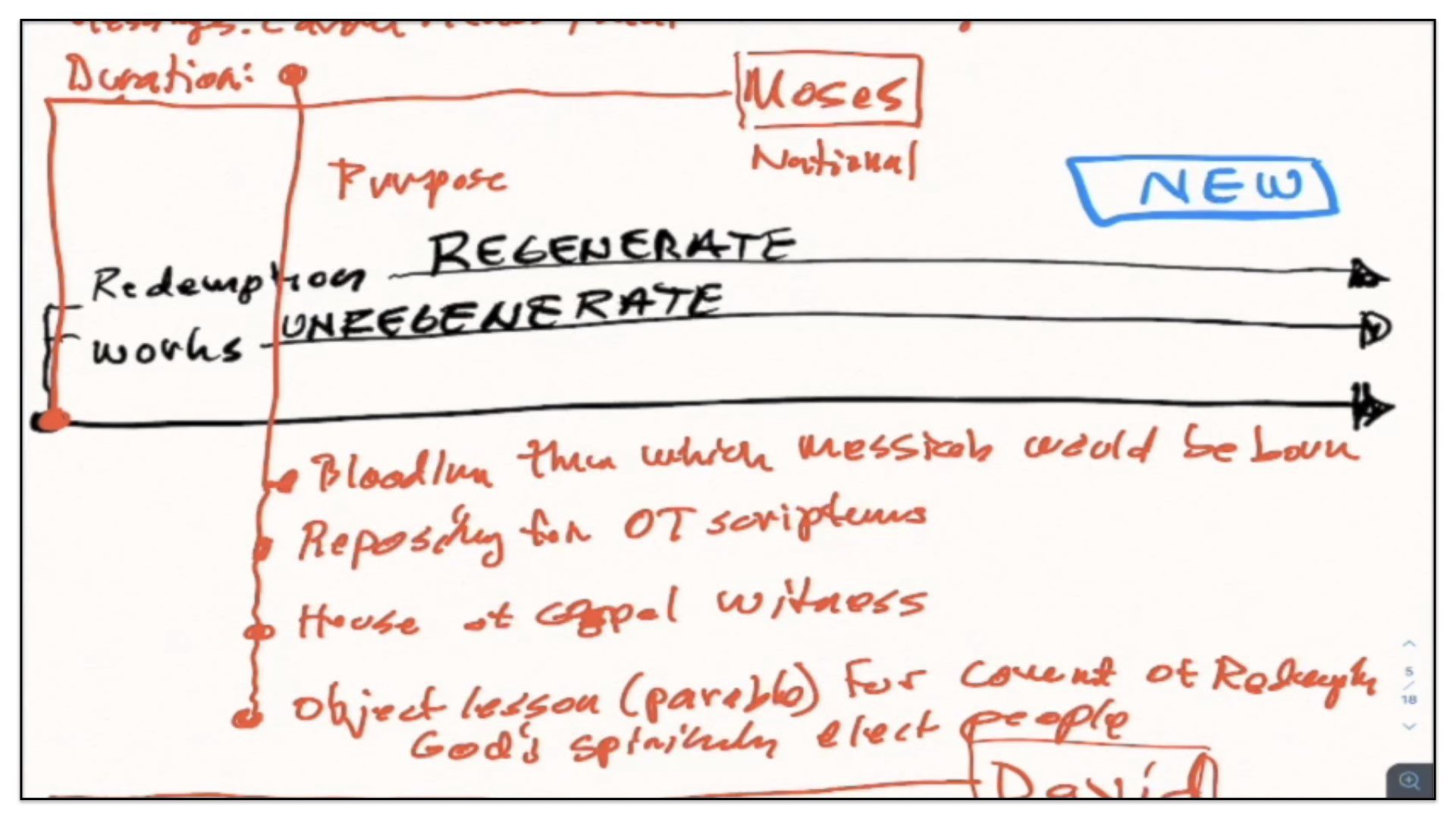
The fourth purpose God established the Mosaic Covenant was this, and I’ve just touched upon it—the Jewish people as a nation were to serve as an object lesson, an object lesson for what? An object lesson, we can say parable, it’s the same thing, they were to be a parable or an object lesson for two things. First, for the Covenant of Redemption; and secondly, for God’s spiritually elect people. What does that mean? It means when we read the Old Testament scriptures, the Mosaic Covenant illustrates the Covenant of Redemption. Portions of it does. I mean, the Jewish people as a nation were under that covenant; that’s their relationship to God under that covenant. And then there was the gospel house of witness within the Mosaic Covenant. And in some ways that resembles the relationship that we who are God’s spiritually elect people have with the Lord under the Covenant of Redemption. Again, the Jewish people as a nation were God’s physically elect people; they were elected on the basis of their race; the Messiah’s physical family bloodline. Whereas God’s spiritually elect people were elected on the basis of grace; God’s grace, under the Covenant of Redemption. You see the distinction between those, how one is an illustration of the other. And that’s ultimately for our benefit what we can derive from the Old Testament scriptures. We’re able to learn from the Old Testament scriptures as an object lesson, the great love wherewith the Lord loves us according to the Covenant of Redemption.
The Mosaic Covenant Ended Once The Purpose For Its Existence Was Fulfilled
Well, those are the four purposes for which God established the Mosaic Covenant. I therefore come back to ask the question. How long did the Mosaic Covenant last? Has it been terminated? What’s its duration? Well look, when the Messiah was born, all four of these purposes were fulfilled. And therefore I believe the Mosaic Covenant came to an end.
First Purpose—The Messiah Was Born Of The Virgin Mary

Take the first of these purposes, for instance, the bloodline through which the Messiah would be born. Well, Christ was born and Mary and Joseph called His name Jesus. So the first purpose was fulfilled.
Second Purpose—The Old Testament Scriptures Were Complete At The Time Of The Messiah’s Birth
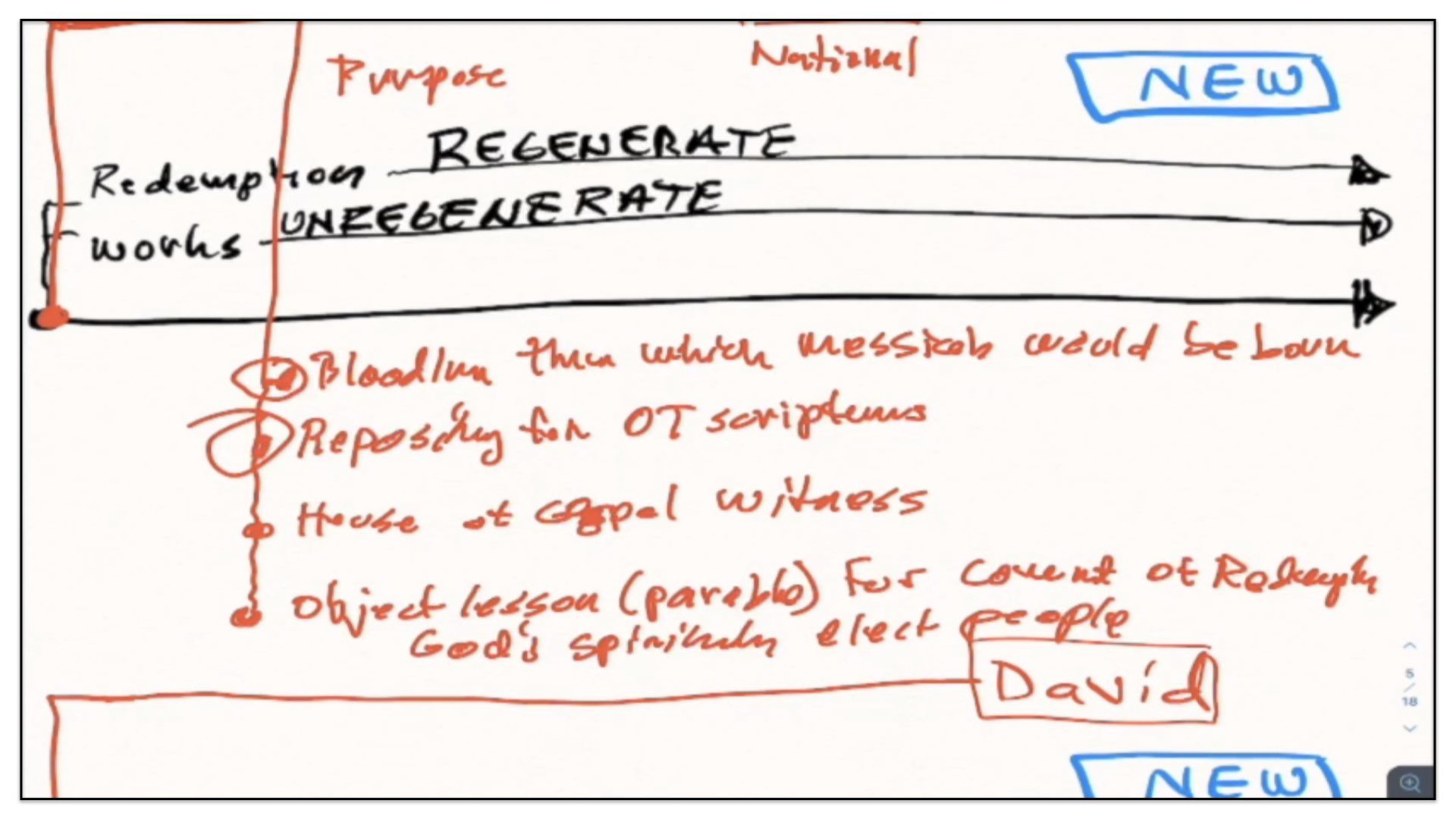
Look at the second purpose, a repository for the Old Testament scriptures. Well, by the time the Messiah was born the canon of the Old Testament scriptures had been completed for almost 400 years. So the second purpose was accomplished.
Third Purpose—The Tabernacle/Temple Was Replaced As A House Of Gospel Witness With The Church (Organized By Christ)
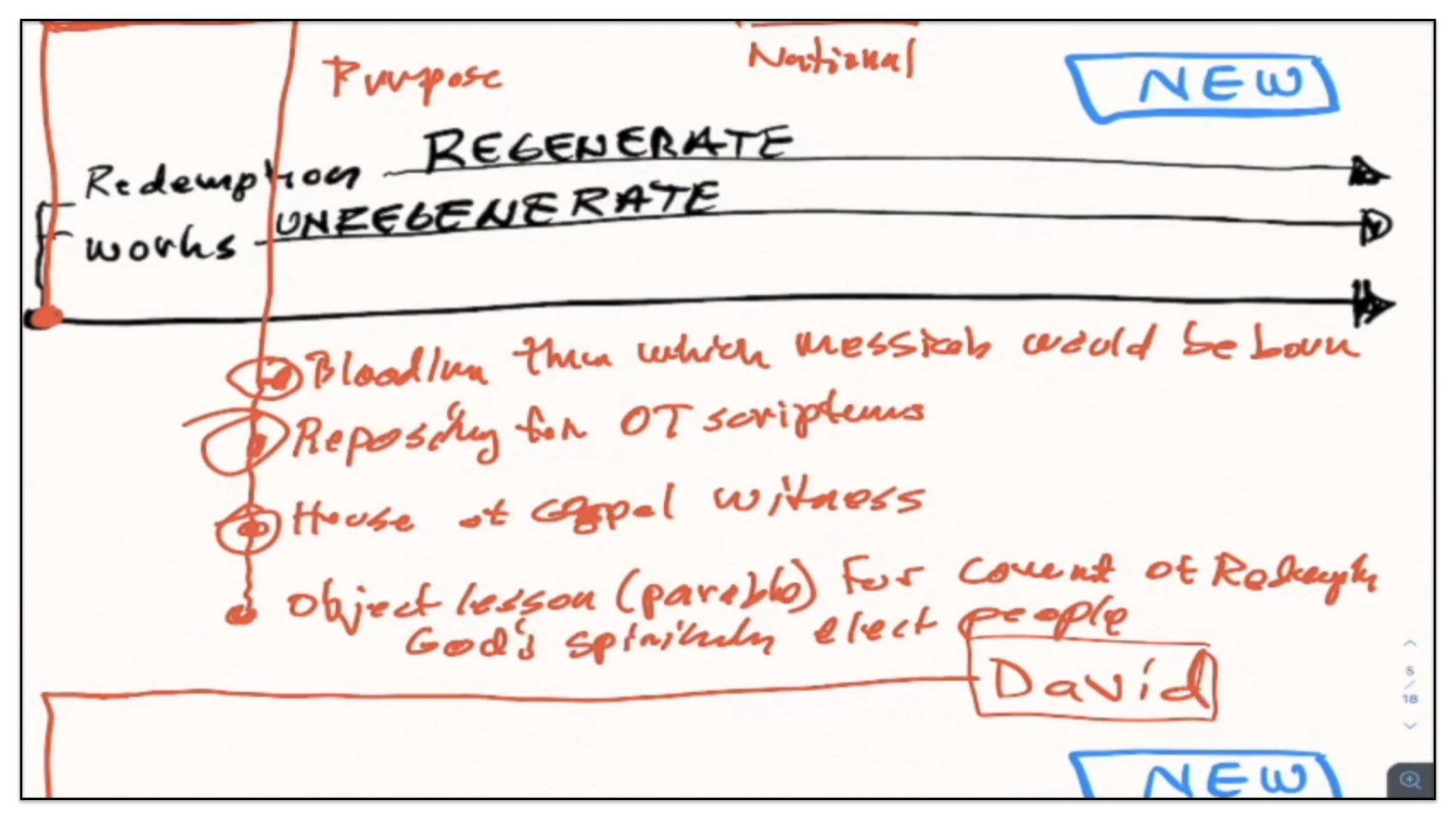
What about the third purpose, a house of gospel witness? Well, this purpose was fulfilled, the house of gospel witness epitomized by the tabernacle and temple under the Mosaic Covenant was replaced with the redeeming work of Christ. I should say, fulfilled with the redeeming work of Christ. Christ Himself is the gospel. He accomplished the work at Calvary and through His active obedience throughout the course of His earthly ministry. And Christ Himself established the church.
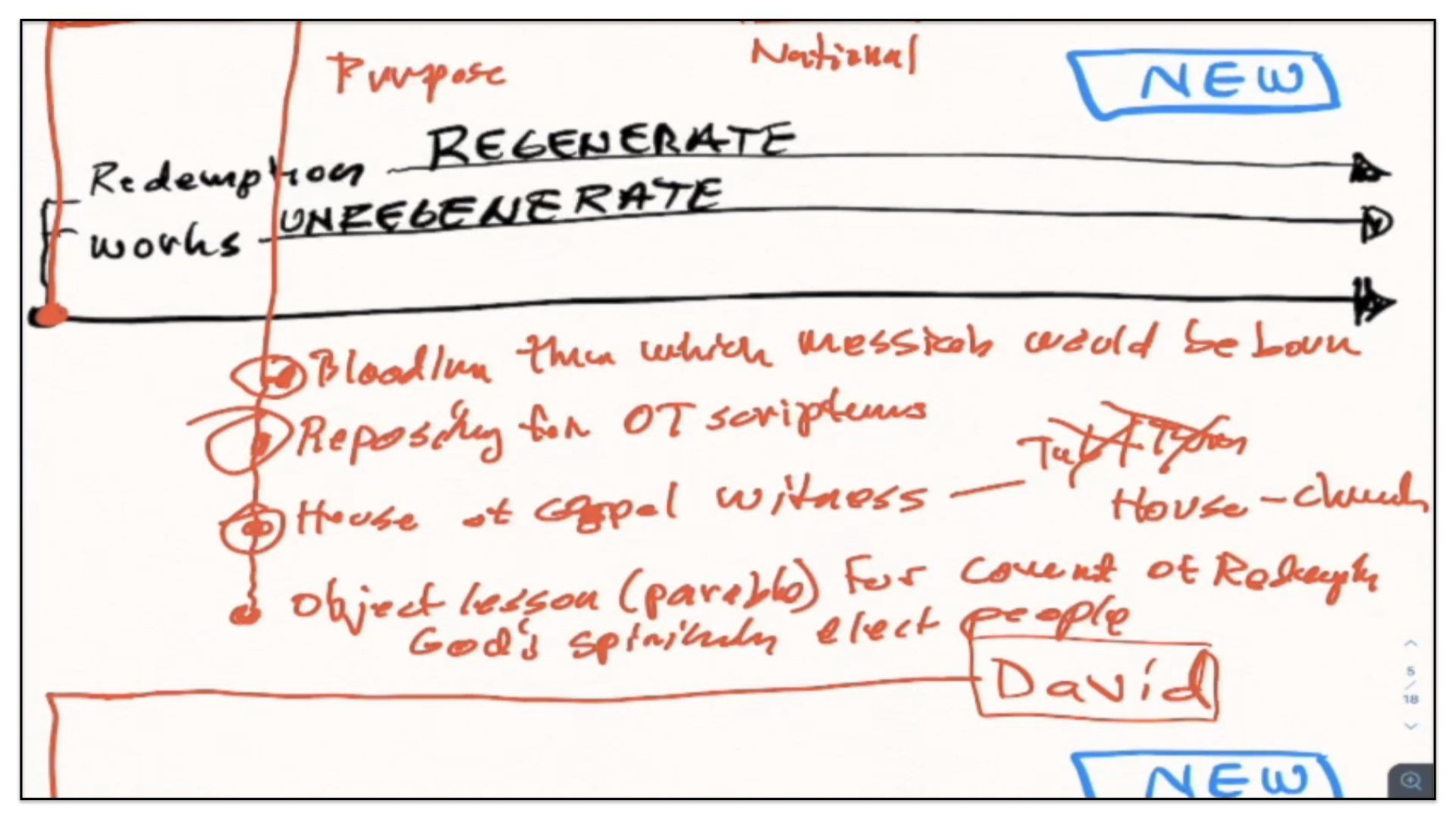
Now you see, the church was not in existence prior to the Lord’s earthly ministry. I’ll get into this point in a later study, maybe in three or four weeks from now and I’ll bring a special study on the difference between Israel and the church, but for now, I’m just highlighting for you that the house of gospel witness under the Mosaic Covenant, which was the tabernacle and temple, had now come to an end, and Christ established a new house of witness in the church, a local visible congregation of baptized believers in Christ.
Fourth Purpose—The Old Testament Scriptures, Which Record The History Of The Jewish People As A Nation, Is Given To The Lord’s People After The Messiah’s Birth, That They Might Through Patience And Comfort Of The Scriptures Have Hope
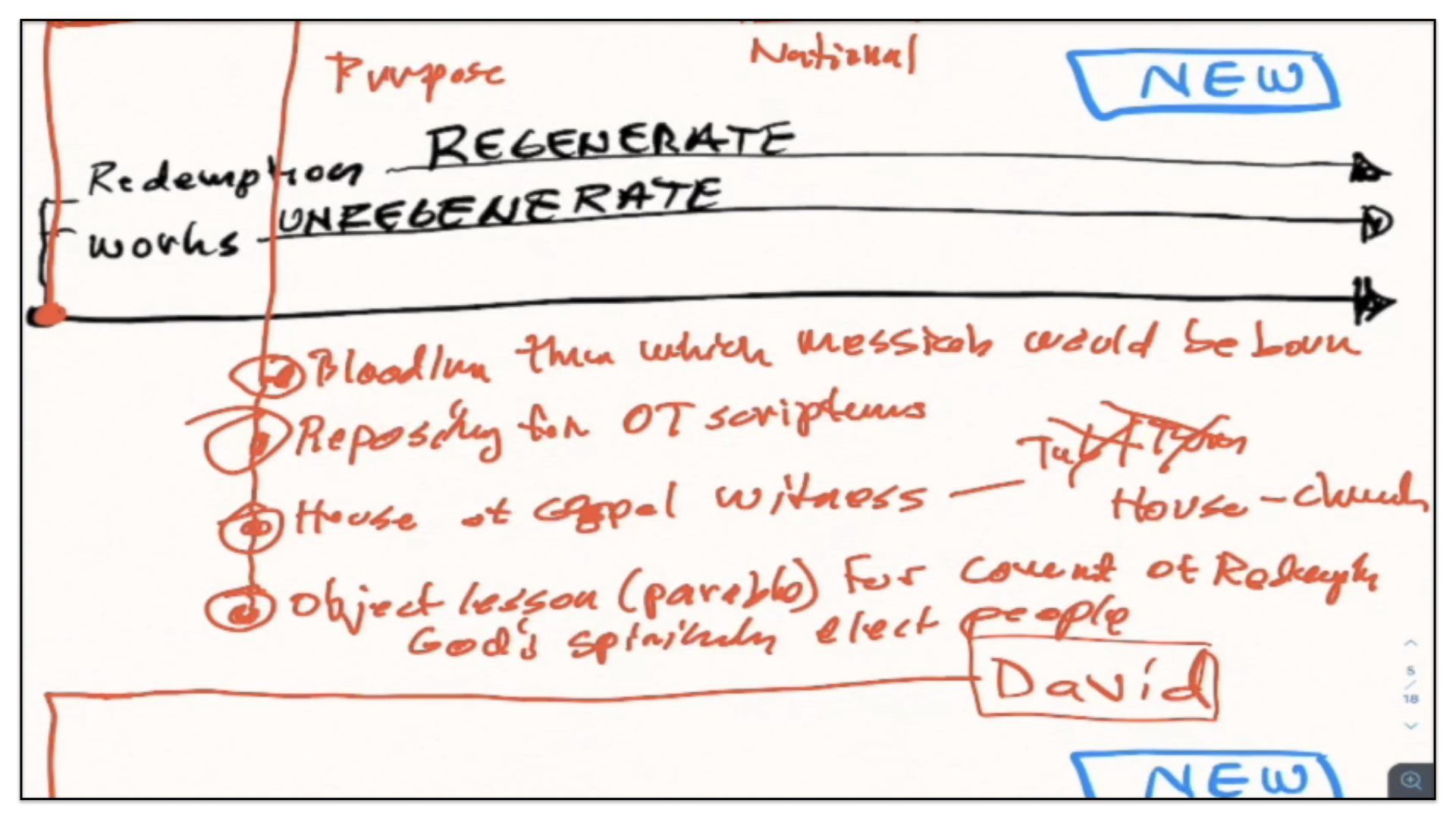
And then for the fourth and final purpose, an object lesson, well of course, this was accomplished. We now have not only the Old Testament scriptures but the New Testament scriptures. You remember what we read in Romans chapter 15 and verse 4. I won’t turn to the passage for you. Just listen to me read it—“For whatsoever things were written afore time were written for our learning, that we through patience and comfort of the scriptures might have hope.” Think about that. In fact, I am going to read it for again. I really want you to capture this, what I’m about to tell you. This is Romans chapter 15 and verse 4. Listen to it again. Paul wrote, “For whatsoever things were written afore time,” that’s referring to the Old Testament scriptures, were written for who? “For our learning,” who are living after the birth of the Messiah. “That we,” who are living after the messiah’s birth, “might through patience and comforts of the Old Testament scriptures have hope.” Capture the significance of this. The fourth reason the Jewish people as a nation, under the Mosaic Covenant, was established by God is to serve as an object lesson for us that are living after the birth of the Messiah on now we can now glean wonderful truths about the Covenant of Redemption and our relationship with God by using the Old Testament scriptures as an illustration of that relationship and of the Covenant of Redemption. And that’s what the Old Testament scriptures do for us, you see. Listen, there’s many people that will emphasize the unfolding drama of redemption throughout the Old Testament scriptures. They’ll say, that was meant for the Old Testament saints living at that time before Christ came into the world. They’ll say, look God was slowly unfolding His will of the coming Messiah and people during the Old Testament era were gradually and progressively understanding the Messiah coming in. I want to reverse that. I’m suggesting to you that the Old Testament scriptures primarily have been given not for the Old Testament saints living before the birth of the Messiah, but rather they are given to those of us who are born after the birth of the Messiah. The Old Testament scriptures were written for our learning, for our benefit, that we who live after the birth of the Messiah might read the Old Testament scriptures and find comfort and hope as we see the Covenant of Redemption and God’s spiritually elect people illustrated by the Mosaic Covenant and the nation of Israel as a physical race of people chosen by God.
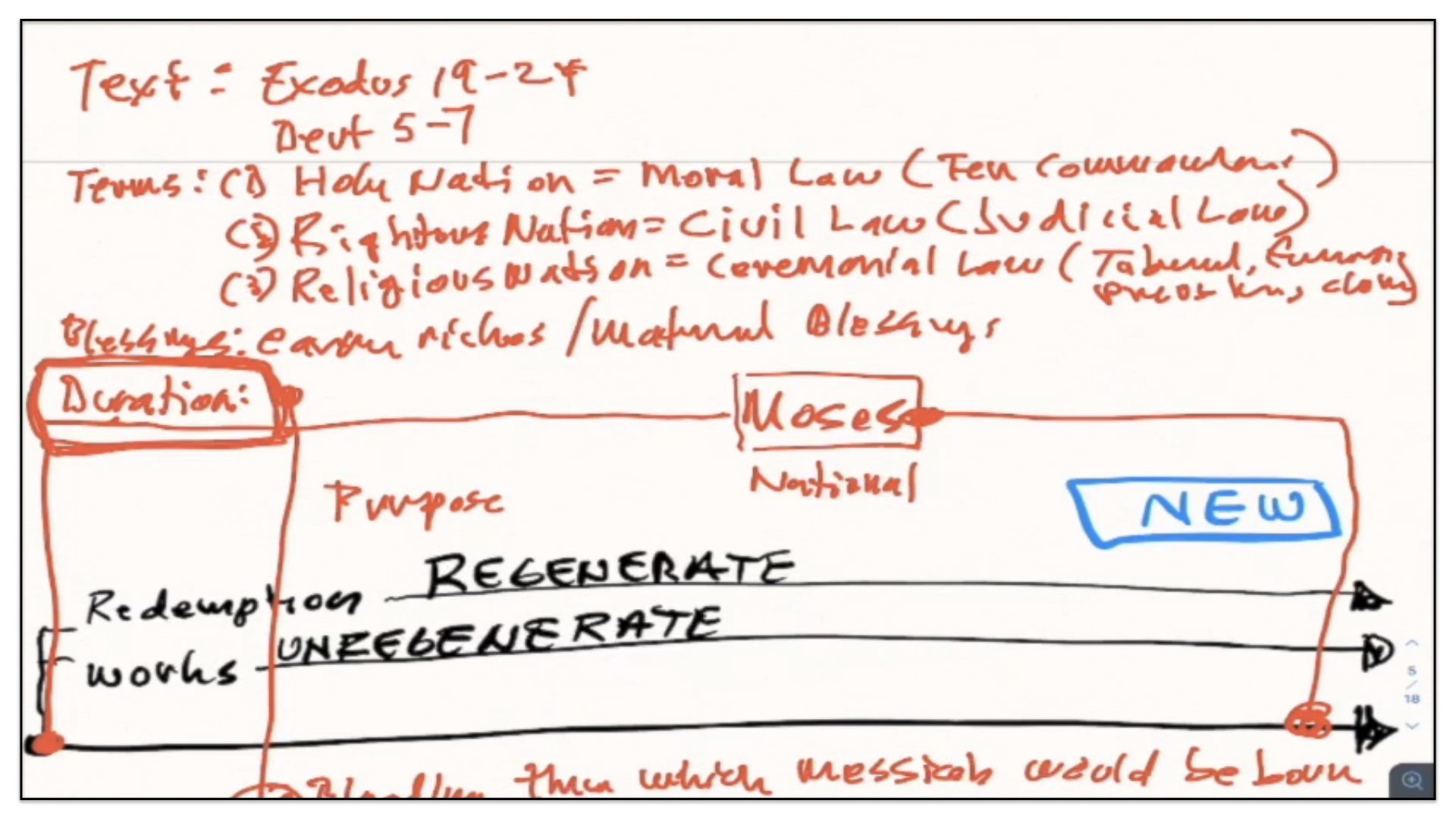
I hope you captured the points I’m making here, bringing me to the final conclusion. The Mosaic Covenant ended with the birth of Christ. The coming of the Messiah and particularly with His death, burial, resurrection and His ascension into heaven. Well, that’s what I have to say on the issues of the Mosaic Covenant.
The Davidic Covenant—Its Royal Emphasis On The Messiah’s Bloodline
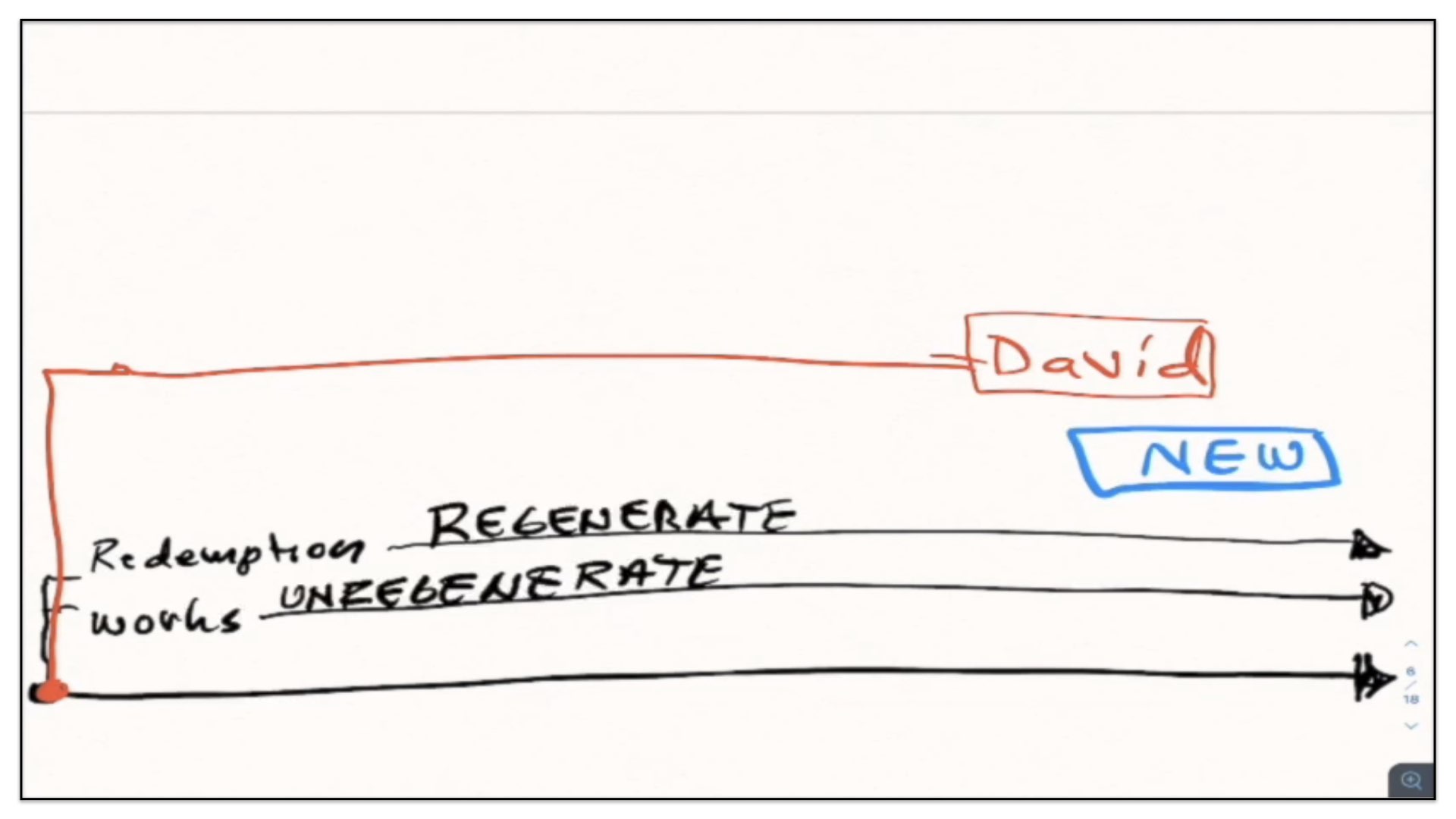
This now brings me to the next covenant, the third and final covenant and that is the covenant God made with David. Now, I’m just gonna have to use this timeline. In fact, let me just erase these other ones, we’ll make our new space with our notes. There we go. Here’s the covenant God made with David. The Davidic Covenant is built on the previous two covenants—the covenant God made with Abraham and then with Moses, and now He’s making this covenant with David.
The Biblical Record—2 Samuel 7:1-17
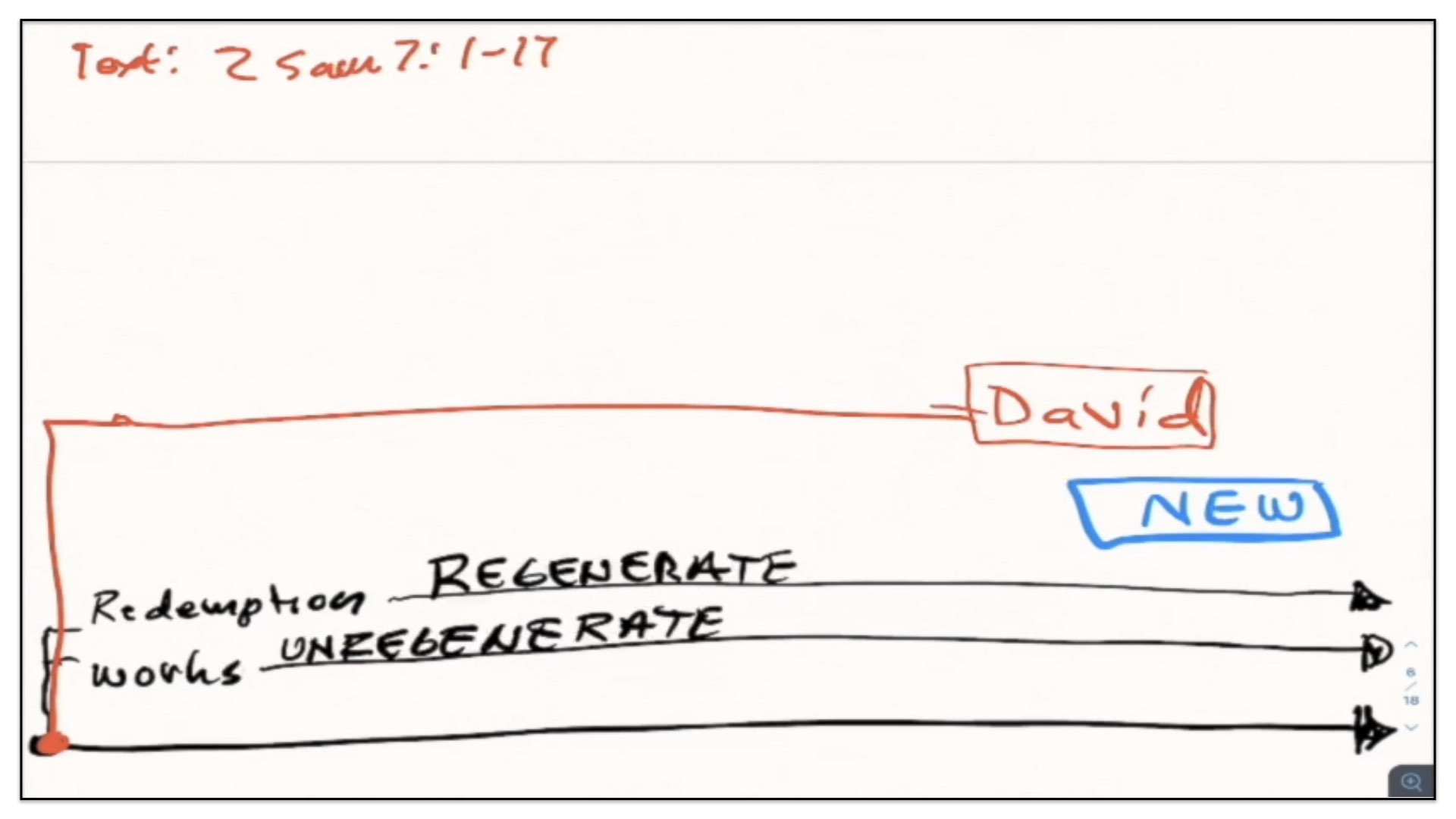
For the text. Where do you find this? You’ll find this covenant recorded in a couple of places, one of which is second Samuel chapter 7 verses 1 through 17. Now again, I hope you’ll read that in your own time this week.
The Terms/Conditions—Obedience To The Lord
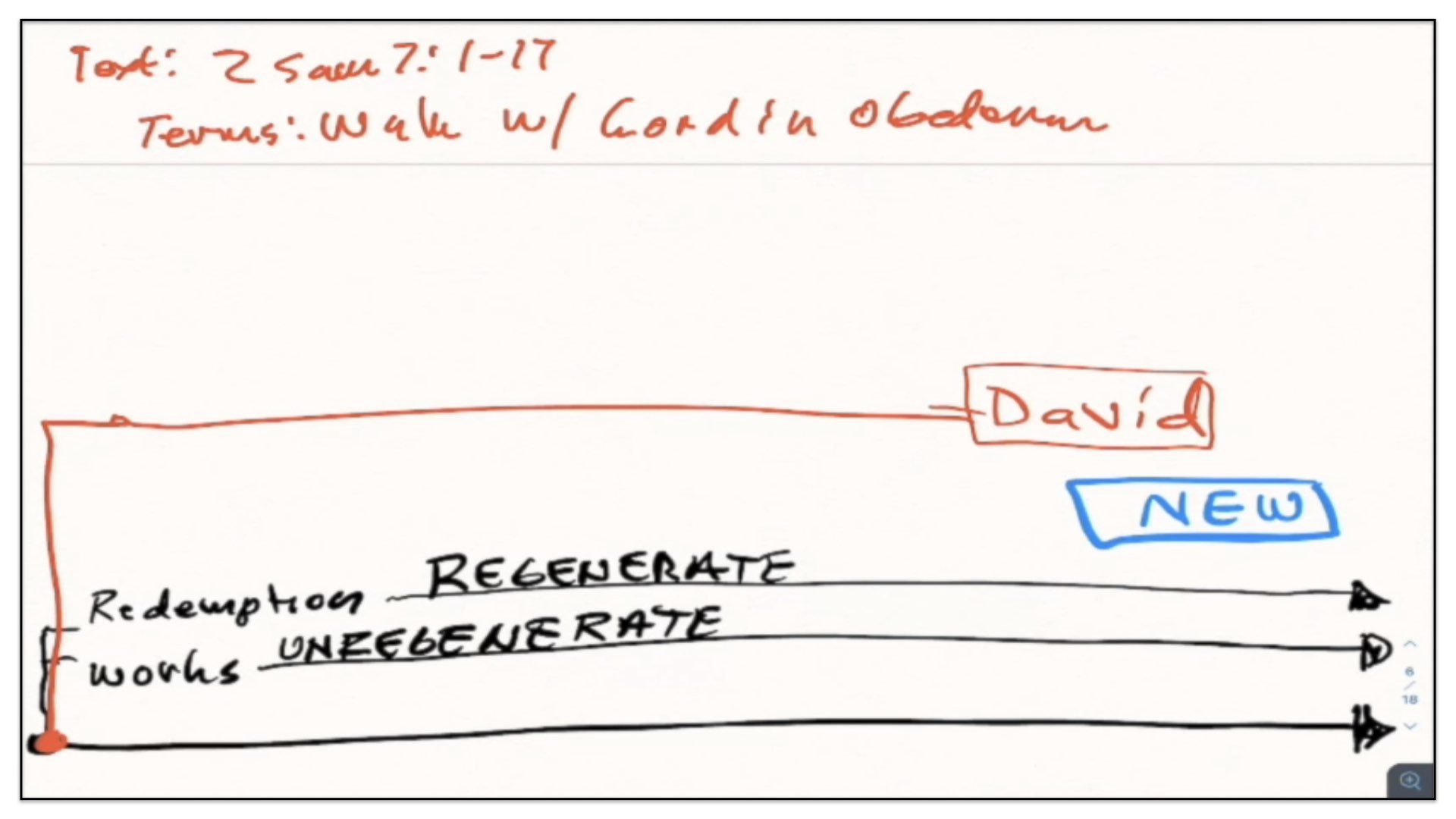
Let me just highlight for you some of the things you’ll find recorded in the text. For the terms or conditions of this covenant. Well, the terms of this covenant are these: David was to walk with the Lord in obedience until the end of his days. You’ll find that in the 12th verse of the seventh chapter. David was to walk with the Lord in obedience to the end of his days. It’s the exact same requirement God had of Abraham. Remember, God told Abraham the conditions of that covenant was that Abraham walk with the Lord in obedience? And so God makes the same conditions to David. He was to walk with the Lord in obedience to the end of his days. Well, that’s the terms of this Covenant.
The Promises/Blessings—(1) David’s Children Would Possess The Land; (2) A Temple Will Be Build In The Name Of The Lord; (3) The Throne Of His Kingdom Would Be Established Forever
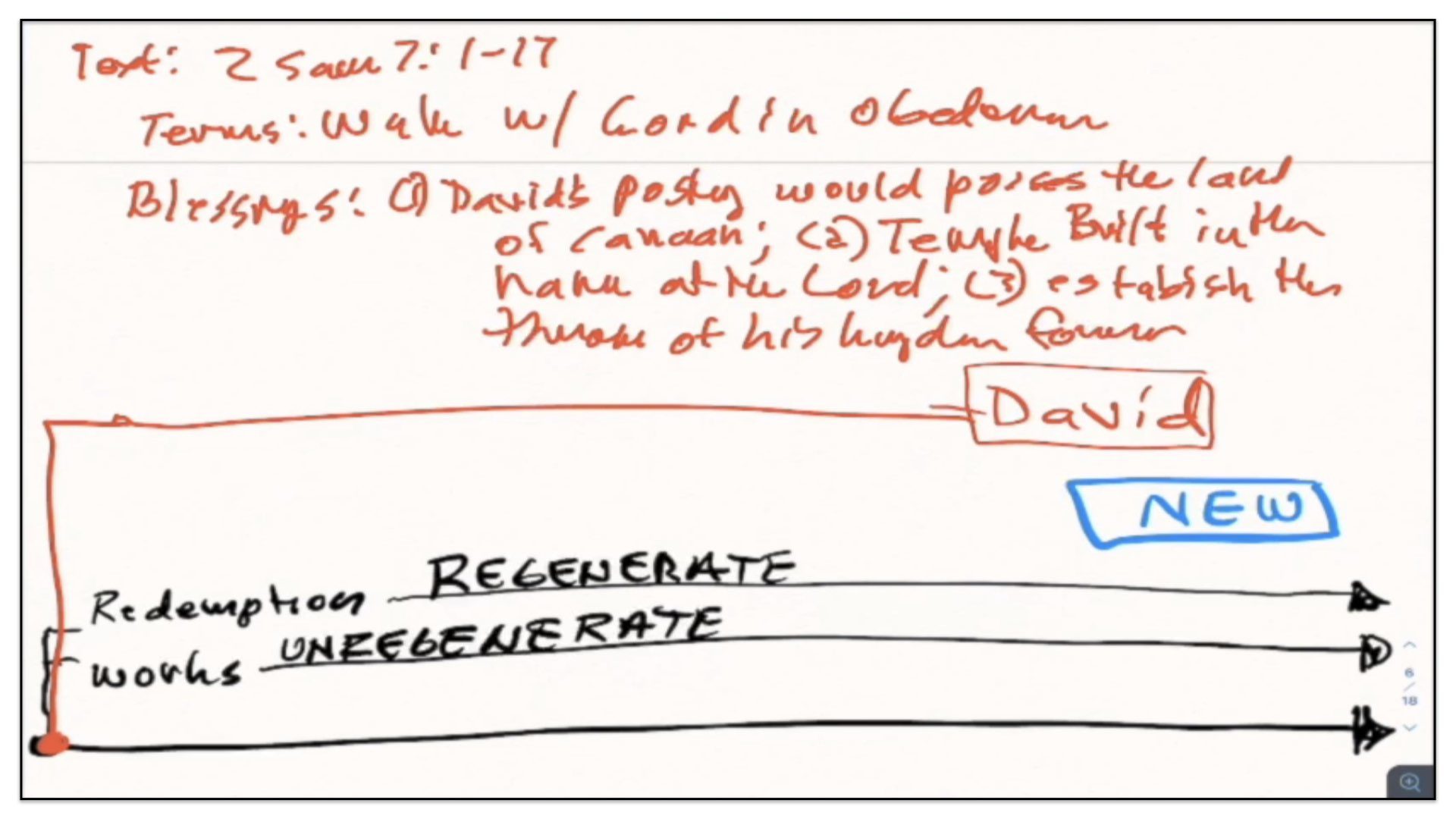
What about the blessings? What blessings did God promise under this covenant? Well, there’s three blessings. The first is this—David’s posterity, his children, would possess the land of Canaan. Now that’s the same promise that God made with Abraham, and then again with Moses on behalf of the children of Israel as a nation, but He’s renewing that promise once more with David. David’s children are going to possess the land of Canaan. Secondly, God promises that a temple will be built in the name of the Lord. Up until this point there was no temple. There was a tabernacle, but not a temple. Not a permanent structure, a house, for the Lord. But now God promises there will be a house built for Him. And then thirdly, the Lord promised to establish the throne of his kingdom forever. He would establish the throne of his kingdom forever. That’s the three promises, the blessings promised by God under this covenant with David.
The Duration/Termination—It Ended With The Birth Of The Messiah
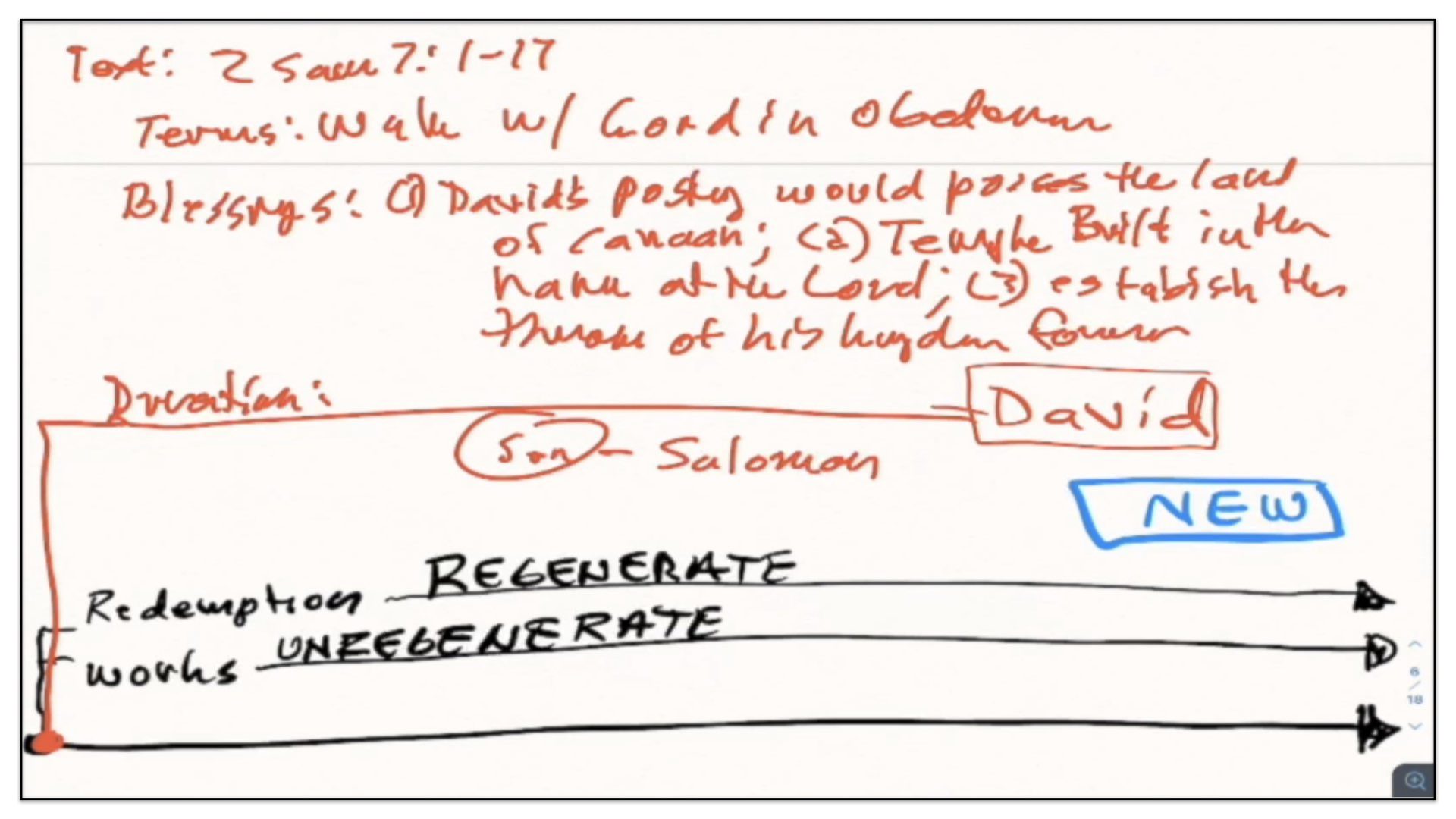
Now, what about the duration of this covenant? For how long did it last? You’re not going to be surprised when I tell you, this is not an everlasting covenant. Now I know, there’s language that refers to it as an everlasting covenant, but please listen to me, in the same way that the Abrahamic Covenant and the Mosaic Covenant were everlasting, in the sense that they accomplished their purpose, so the same is true of the covenant God made with David. This covenant would accomplish its purpose and then it would be terminated. Of course, we must then ask, what is the accomplishment of this covenant? When was it fulfilled?
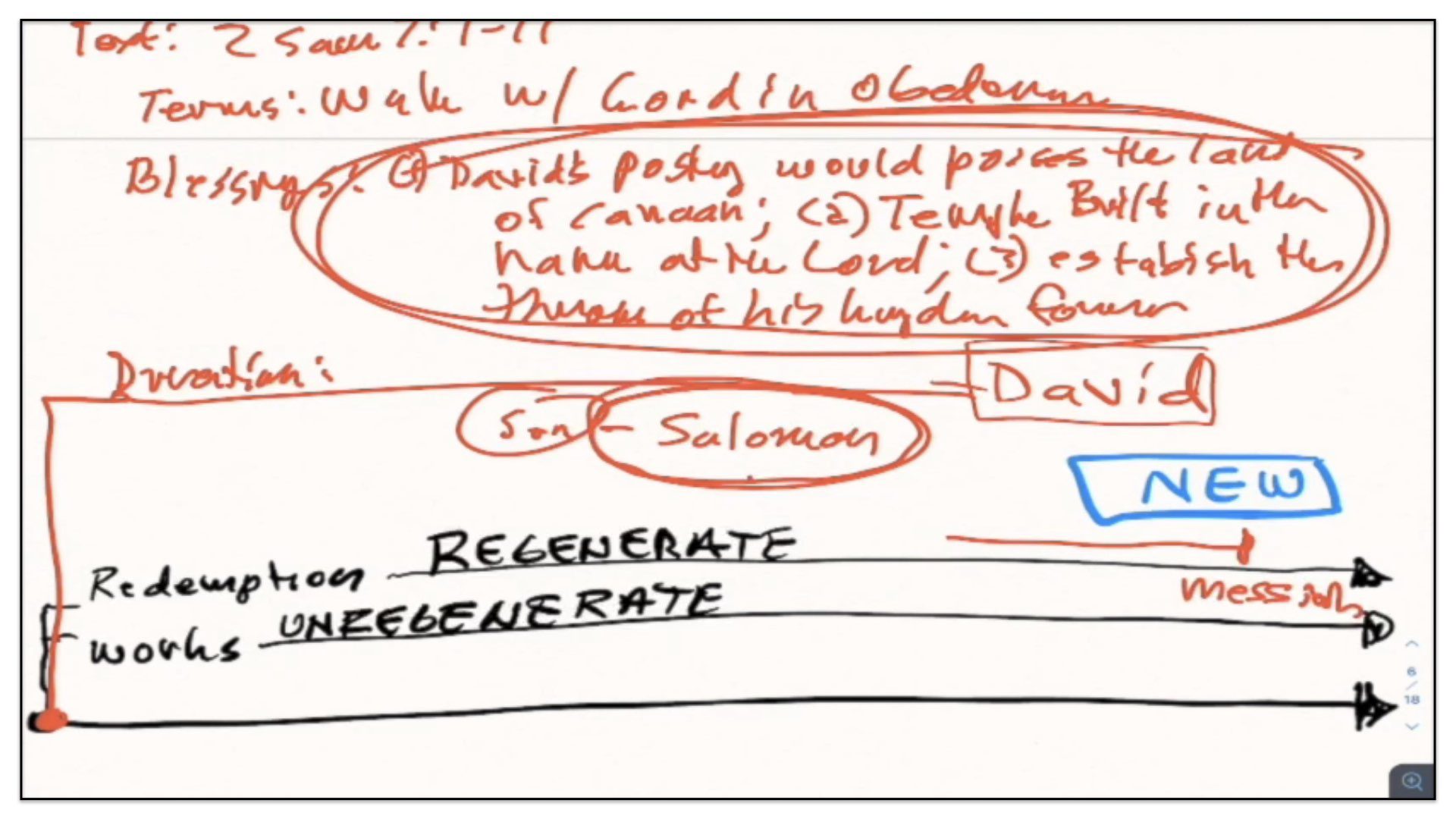
Well much of the Davidic Covenant was fulfilled in David’s son, Solomon. Remember, after David died, Solomon came to the throne and reigned over the house of Israel for 40 years. In fact, it was under Solomon’s reign that Israel experienced its greatest time of peace and prosperity. It was during the reign of Solomon that truly the promises God gave to Abraham, that the people would be enriched and Abraham’s family would be blessed, blessed with earthly blessings and riches, it was under Solomon’s reign that the zenith of those blessings came upon the people. After Solomon’s reign, it was a very slow and gradual decline until the end of the nation. But during Solomon’s reign, these promises were fulfilled, largely under Solomon’s leadership.
Now, having said that, there is a part of the Davidic Covenant, which like Abraham’s covenant, points directly to the coming Messiah. Remember, the seed of Abraham is Christ. And so the seed promised to David is not only his son Solomon, but the coming seed Who is the Messiah Himself. He’s called the son of David. And it would be this where the Davidic Covenant would come to an end, with the birth of David’s son, the Messiah Himself.
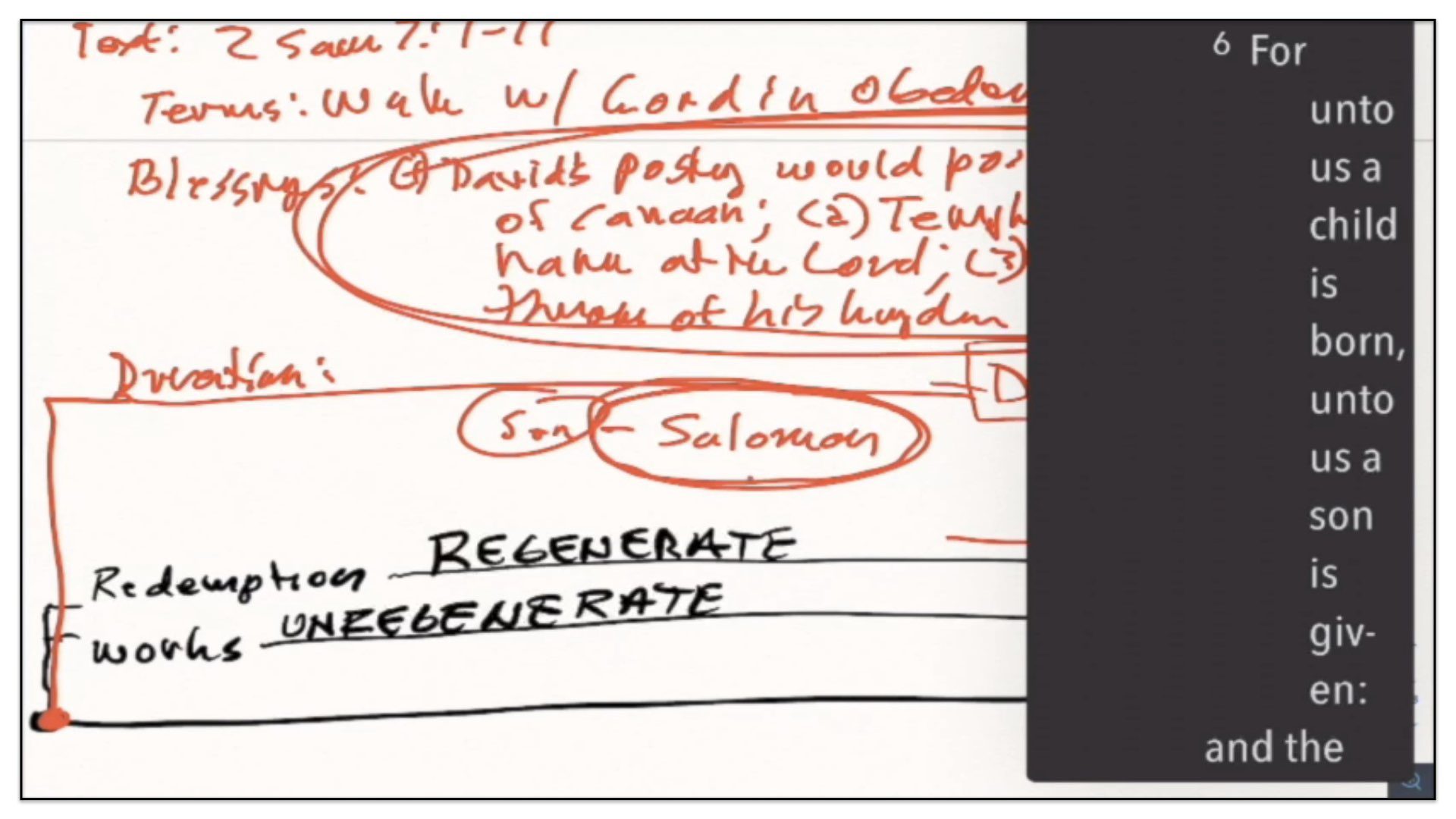
Now, on this point, I do want to read for you several scriptures. The first of these is found in the Old Testament. I’ll be reading for you from Isaiah chapter 9 and I want to begin in verse 6. I’ve made mention of this to you before—the Bible App I use for the on-screen notes, they have a system in their application where it automatically indents a passage of scripture it deems to be part of a poetic statement and I wish they didn’t do that, but they do and that means we’re forced on the edge of the screen to have to read the words in the following format; my apologies of to you for that, but you at least get to see the words as I read them—this is Isaiah chapter 9 and verse 6. And we read, “For unto us a child is born, unto us a son is given: and the government shall be upon his shoulder: and his name shall be called Wonderful, Counsellor, The mighty God, The everlasting Father, The Prince of Peace. Of the increase of his government and peace there shall be no end, upon the throne of David, and upon his kingdom, to order it, and to establish it with judgment and with justice from henceforth even for ever. The zeal of the LORD of hosts will perform this.” What I believe that refers to by prophecy, is that the Davidic Covenant itself comes to an end, but the Messiah Himself enters upon His eternal work, which falls not under the Davidic Covenant, but under the Covenant of Redemption. For remember, the coming Messiah is under the Covenant of Redemption, that’s ultimately why the Messiah is coming is because God the Father has given His elect people to His Son, His Son has agreed to redeem them and to that end the Father will send forth His Son, made of a woman, made under the law, to redeem His people that are under the law and in their sins. And that’s the whole purpose for the Messiah coming into the world. And you see it’s all linked to the Covenant of Redemption.
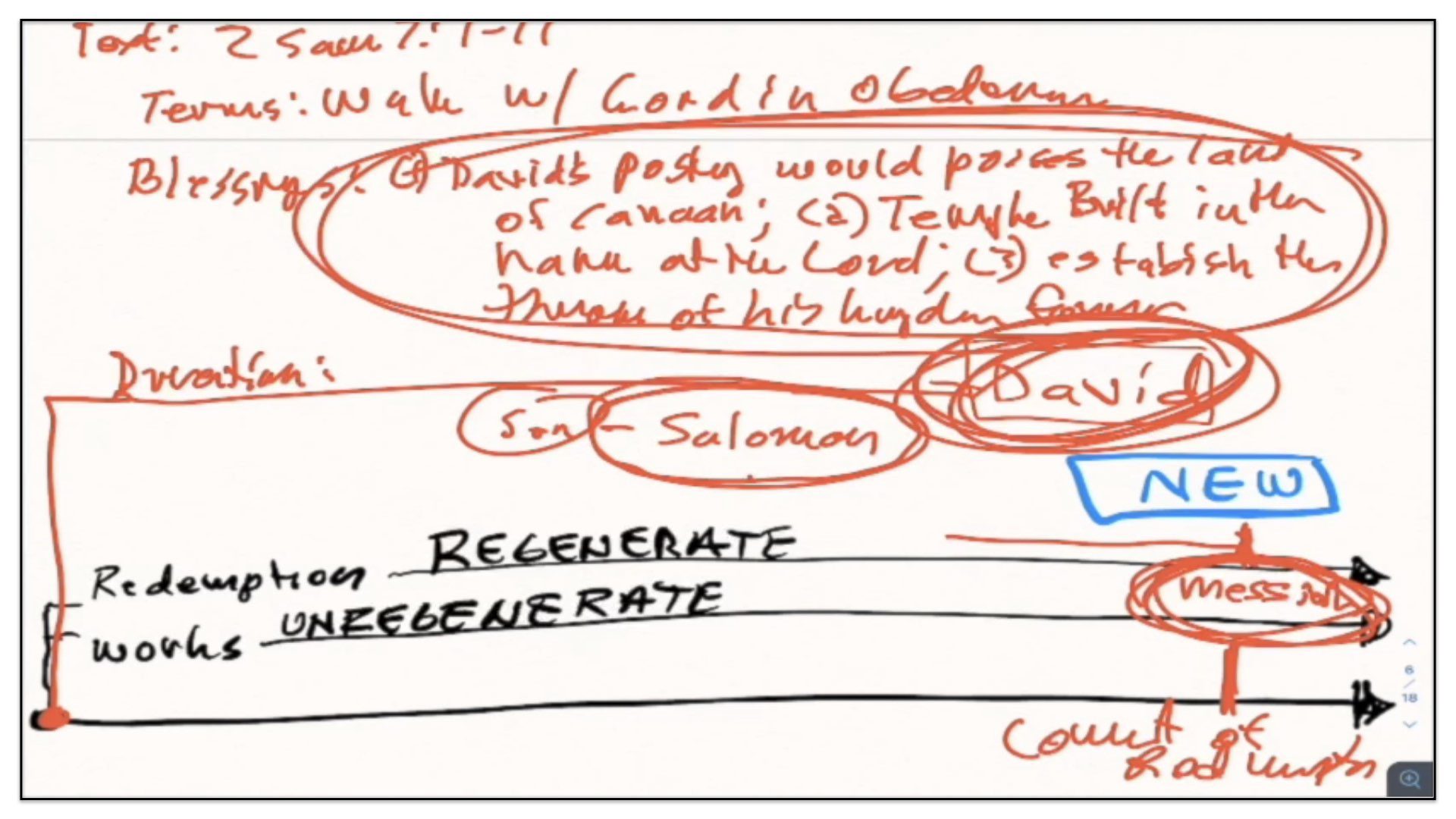
So, the covenant of David comes to an end, covenant God made with David, but the Messiah at this point in His birth, He is then fulfilling the Covenant of Redemption. And in that sense the government is on His shoulders, there shall be no end to His reign, He is the King of kings and the Lord of lords.
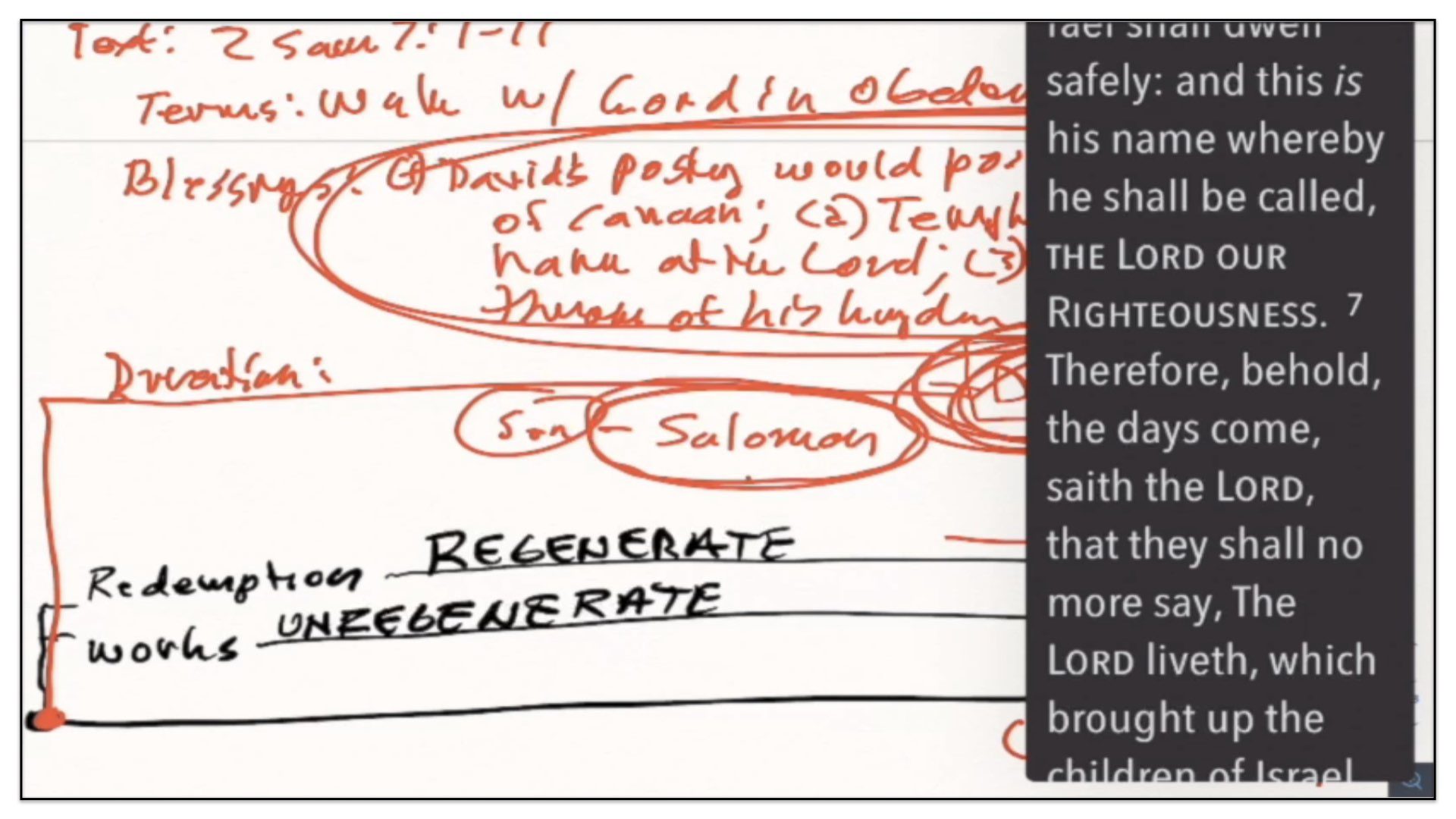
Now, we get something similar in another Old Testament passage and I turn your attention now to Jeremiah chapter 23, and I want to read for you in verse 5—“Behold, the days come, saith the LORD, that I will raise unto David a righteous Branch, and a King shall reign and prosper, and shall execute judgment and justice in the earth. In his days Judah shall be saved, and Israel shall dwell safely: and this is his name whereby he shall be called, THE LORD OUR RIGHTEOUSNESS.” You see that’s a prophecy of the coming Messiah, the son of David, Christ Jesus Himself.
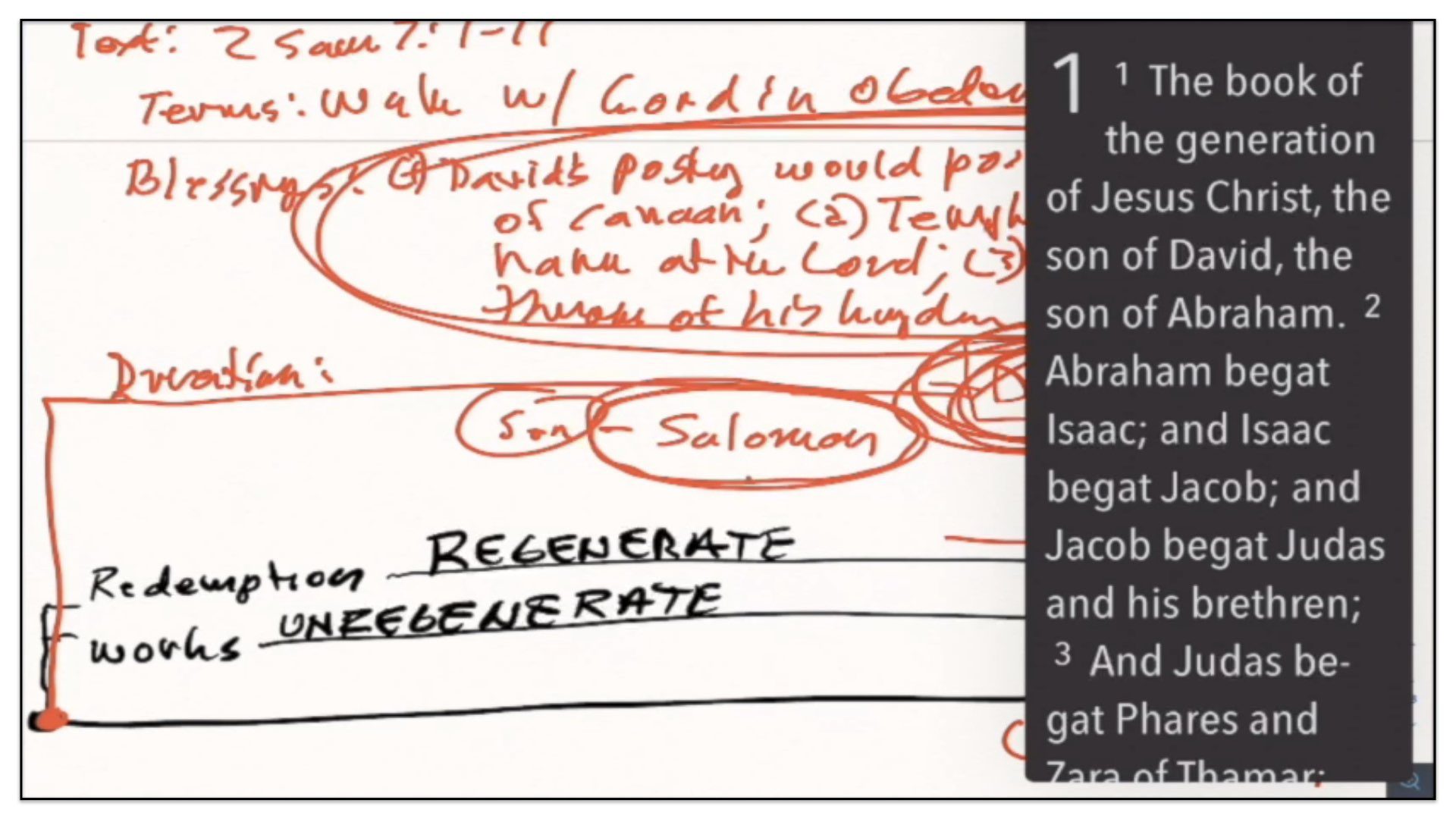
Now I can read to you a couple of other passages, this time from the New Testament. Matthew chapter 1, verse 1. The opening words of the New Testament—“The book of the generation of Jesus Christ, the son of David, the son of Abraham.”
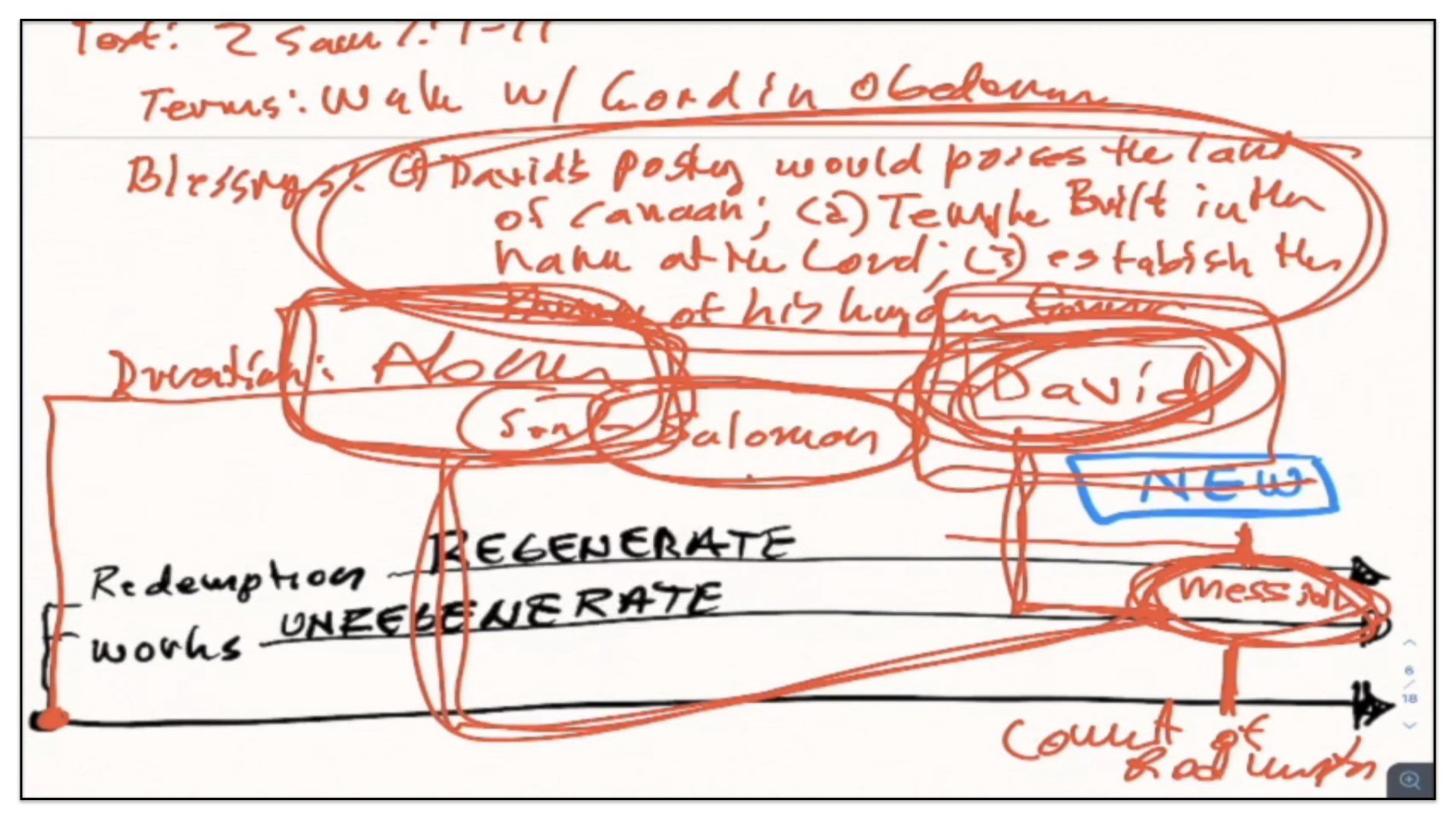
Do you see that? The son of David, the son of Abraham. The two personal covenants God made in the Old Testament The Messiah would be of the seed of Abraham and of the seed of David. And here in Matthew chapter 1, the New Testament opens with those words. Here is the Messiah, the Christ, the seed of Abraham, the seed of David, He’s come and has now fulfilled the Abrahamic Covenant and the Davidic Covenant.
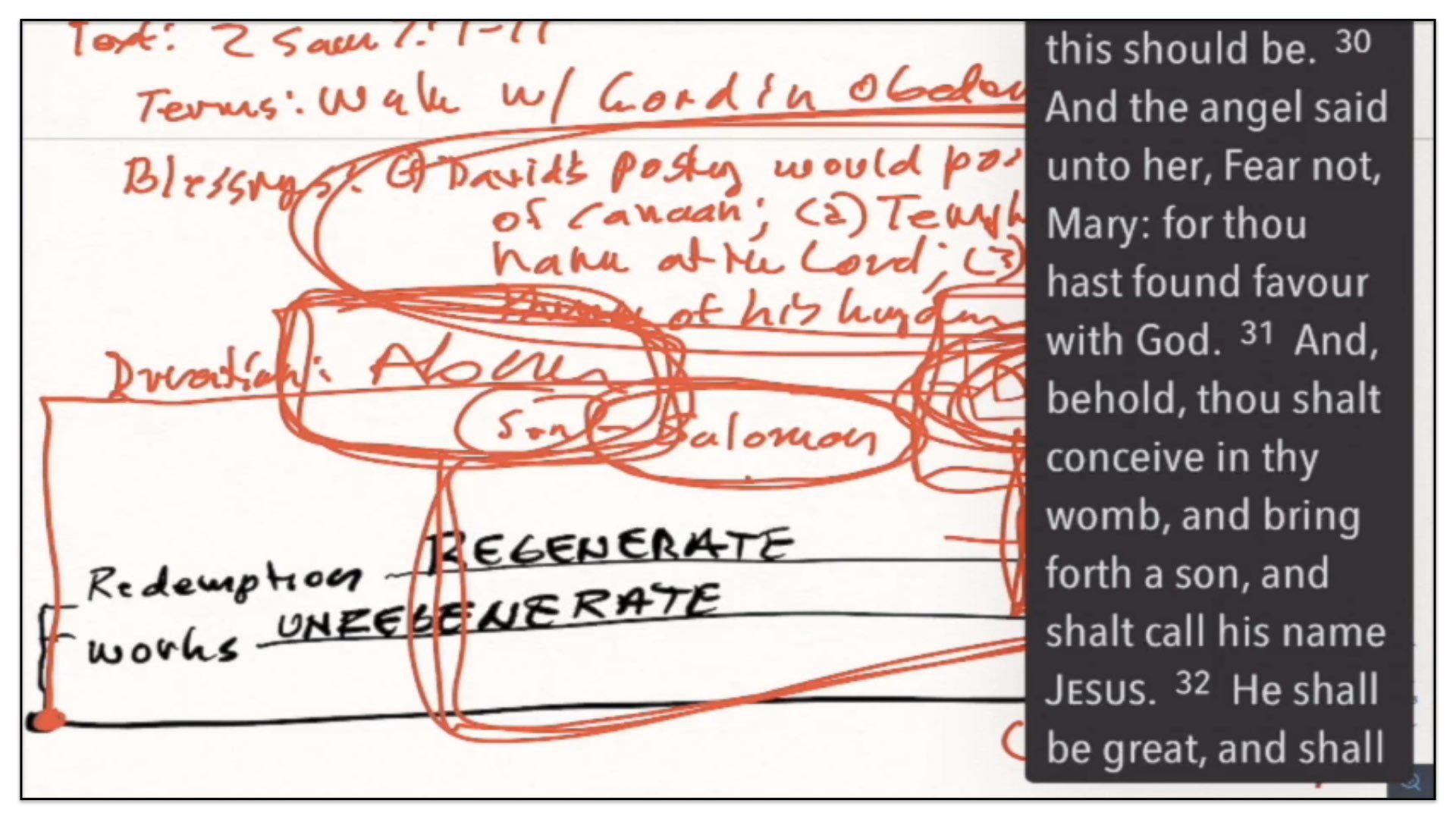
One more passage I’ll read for you is Luke chapter 1 and verse 30. Luke chapter 1 verse 30, and I’ll read down to the 33rd verse—“And the angel said unto her, Fear not, Mary: for thou hast found favour with God. And, behold, thou shalt conceive in thy womb, and bring forth a son, and shalt call his name JESUS. He shall be great, and shall be called the Son of the Highest: and the Lord God shall give unto him the throne of his father David: And he shall reign over the house of Jacob for ever; and of his kingdom there shall be no end.” His kingdom, the kingdom of Christ. This is not an earthly kingdom. This is a heavenly kingdom. This is the kingdom made up of God’s spiritually elect people. This has nothing to do with the Mosaic Covenant or with the children of Israel as a nation. Rather, it has everything to do with the spiritual kingdom of God, the kingdom of God’s spiritually elect people. Under a spiritual and perpetual Covenant of Redemption, or of Grace, an everlasting covenant, the only covenant by which sinners are made right with the holy God. That’s why Jesus said His kingdom is not of this world. And you see, that’s where the Jewish people were making the mistake in the Savior’s day. They went about looking for someone, a Messiah, who was going to reign over an earthly kingdom. They failed to recognize that the Messiah had come to reign as King of kings and Lord of lords over a spiritual kingdom.
The Abrahamic, Mosaic And Davidic Covenants Came To An End With The Birth Of The Messiah
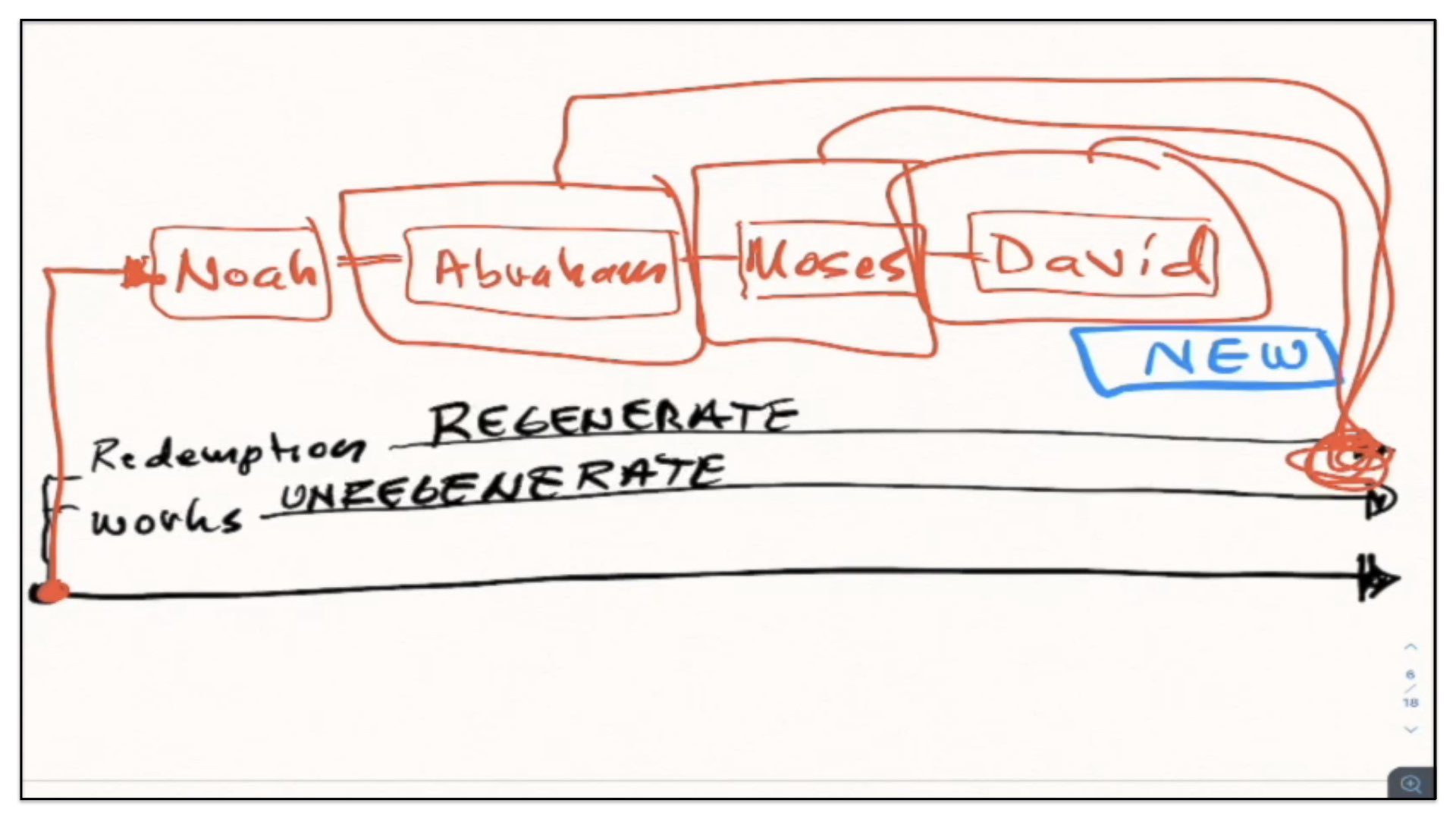
Well, my dear friends, this is my understanding of the three earthly covenants that God made with Abraham, Moses and David. All of these covenants, as I’ve tried to show you, end with the birth of Christ. Now that Christ has been born, the bloodline came to an end. And so did the special honor God placed upon the Jewish people as a race and with the covenants God made with the Jewish people as a race. It all came to an end.
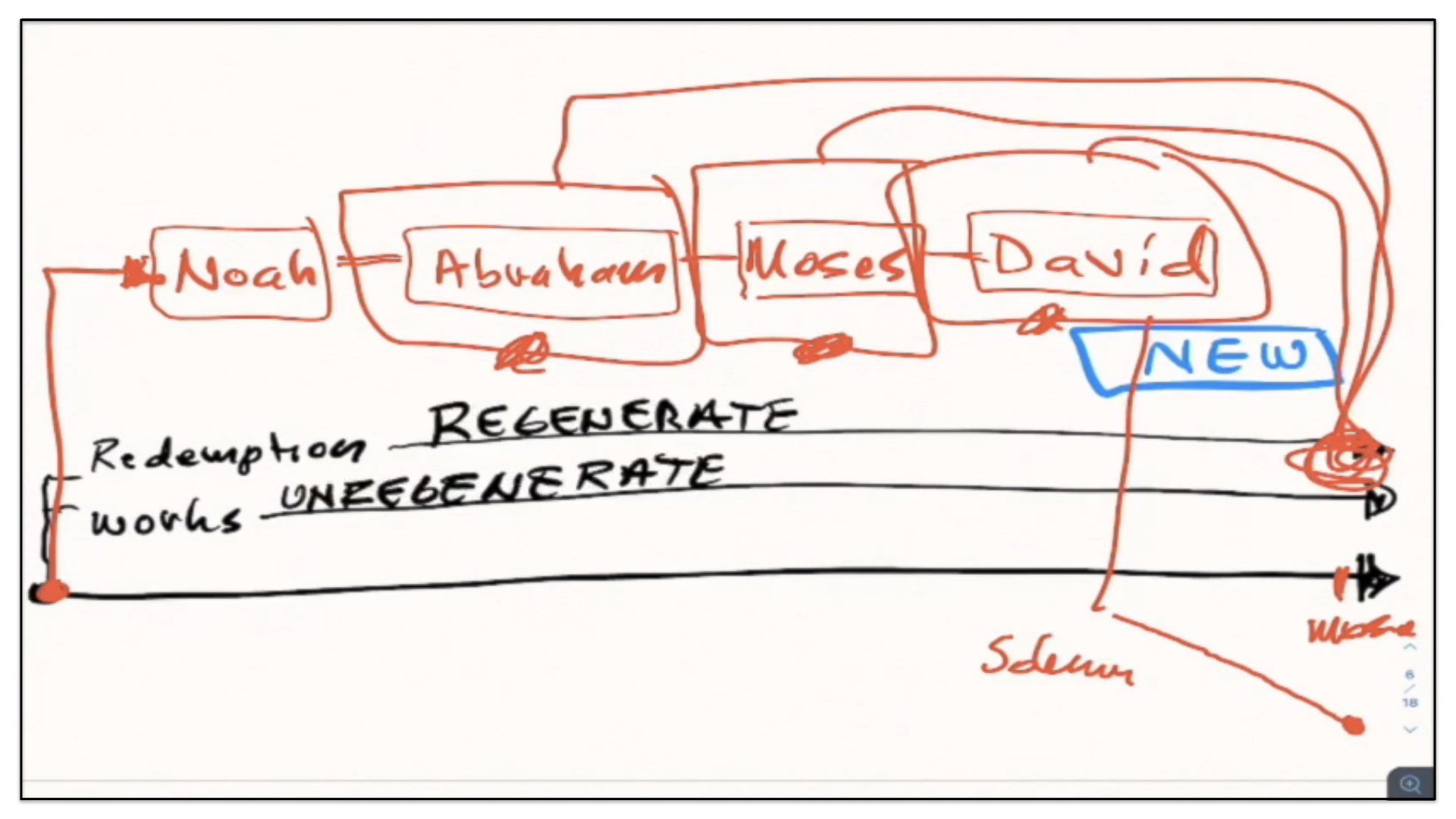
And as I mentioned earlier, between the reign of Solomon and the birth of the Messiah, there was a slow and steady decline with the nation of Israel. And you’ll remember, in Matthew chapter 24, the Lord Jesus Christ prophesies of the end of the Jewish nation, with the destruction of Jerusalem and of the temple, which occurred, of course, in 70 AD. It was a very slow, gradual decline of the Jewish people as a nation. Christ came into the world, was born, died, was buried, rose again, ascended on high, and then around thirty-five years after the Messiah’s ascension to heaven, was the final end of the Jewish people as a nation.
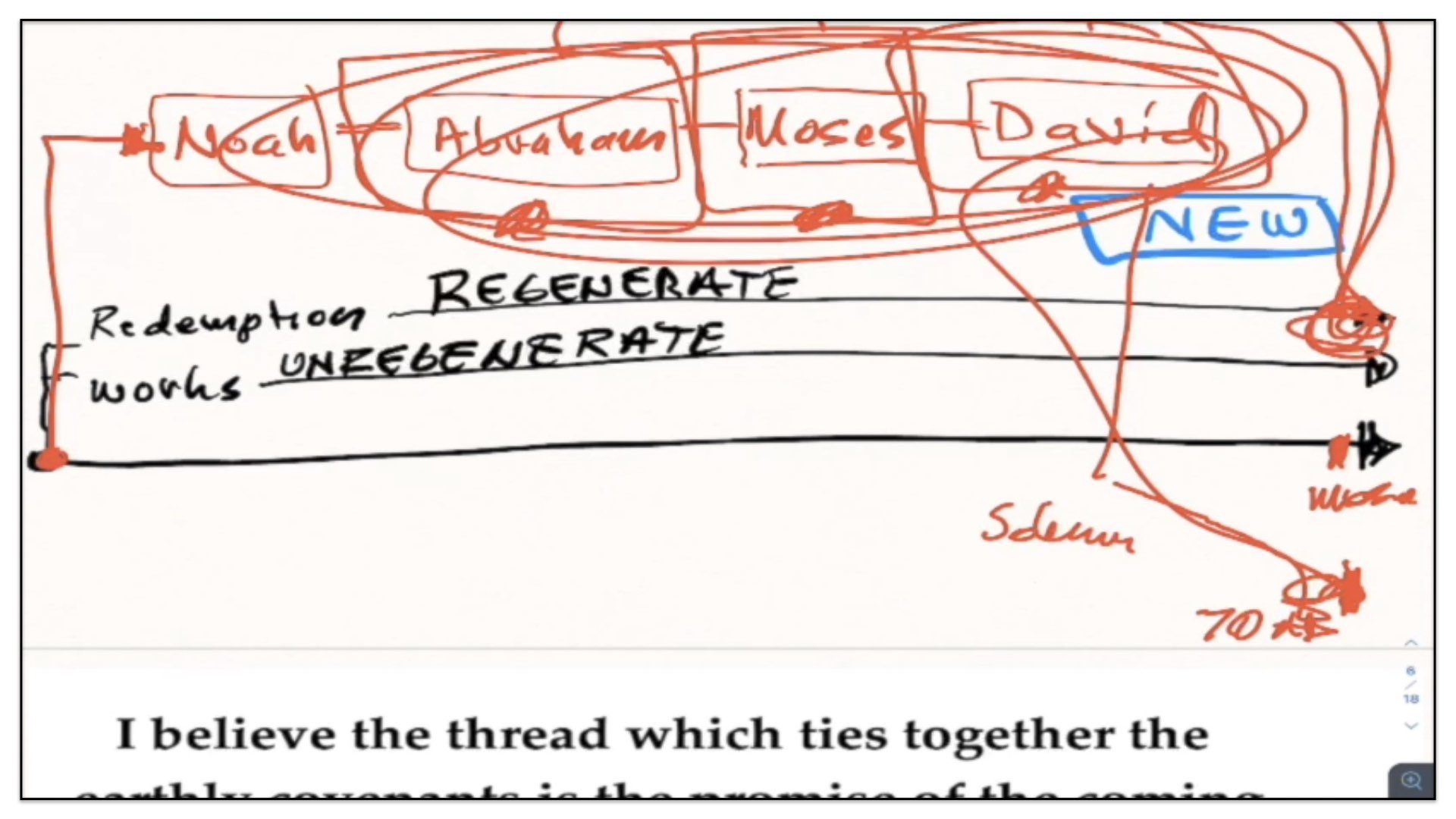
But please listen to me. Although the Jewish people as a nation came to an end in the year 70 AD, together with all of these earthly covenants, it all ended here. God did not sideline the Jewish people as a race. God does not despise the Jewish people as a race. Rather, after the Messiah came into the world, God now deals with the Jewish people as a race the same way He deals with all races of the world, with all nations of the earth. He deals with all of us on the same footing now. The Jewish people as a race are no longer specially distinguished and honored by God as they were leading up to the birth of the Messiah. Once the Messiah came into the world the bloodline ended and now God treats the Jewish people as a race with the same respect He gives to all the other peoples in the world. I hope you understand the point that I’m making on this. And what’s of real interest is that when you’re reading through a lot of the New Testament letters, for instance first and second Thessalonians, Romans and so forth, a lot of those letters are written prior to the destruction of Jerusalem. So they were written during a time when the Jewish people as a nation still technically existed.
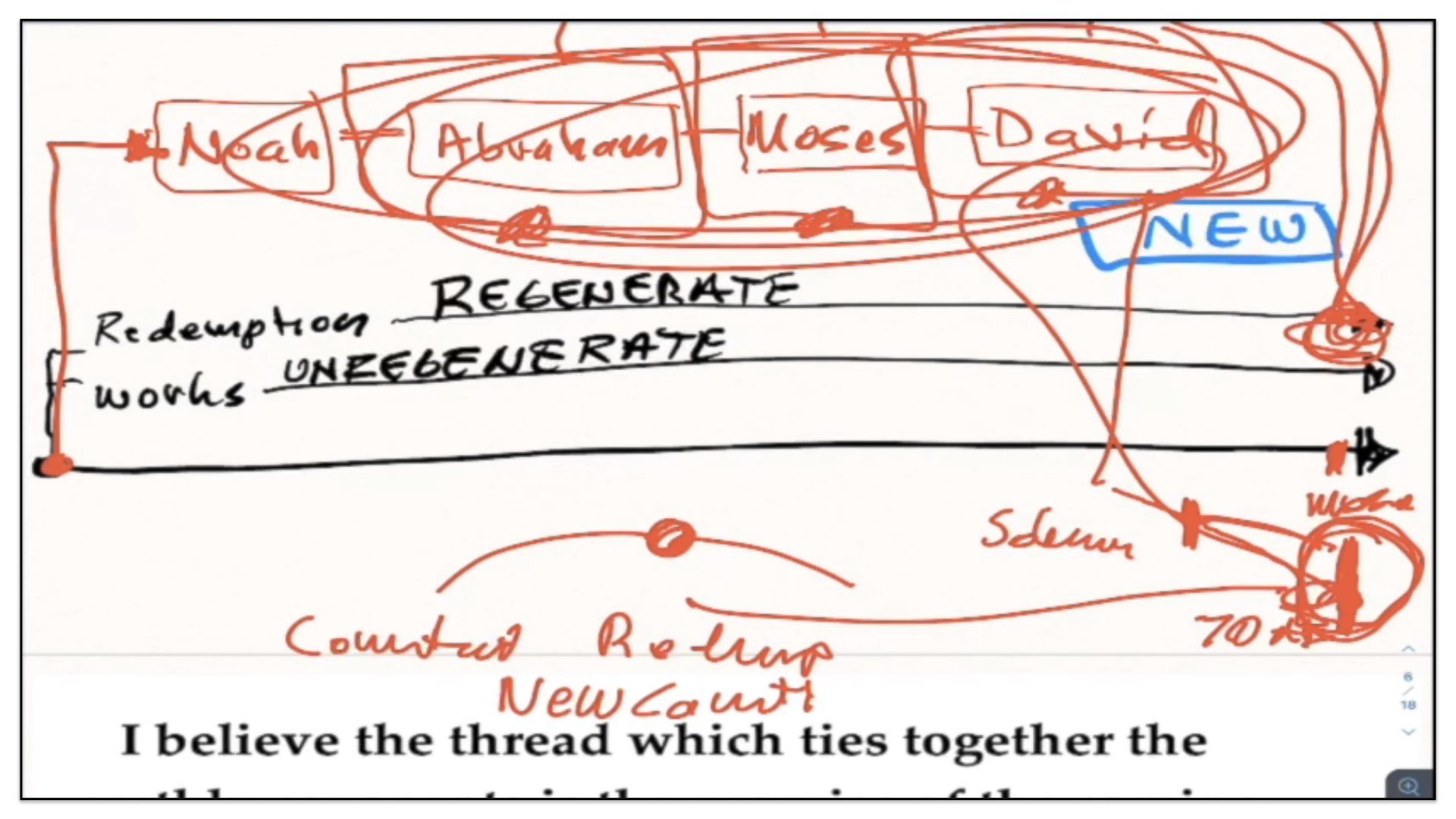
And that’s why in the book of Galatians or Romans, you’ll find Paul dealing with the Jewish people as a nation, explaining to them what it means with the end of their nation, in light of how God now treats them and the world at large. And especially what it means for them in terms of the Covenant of Redemption, otherwise called the New Covenant.
A Final Word
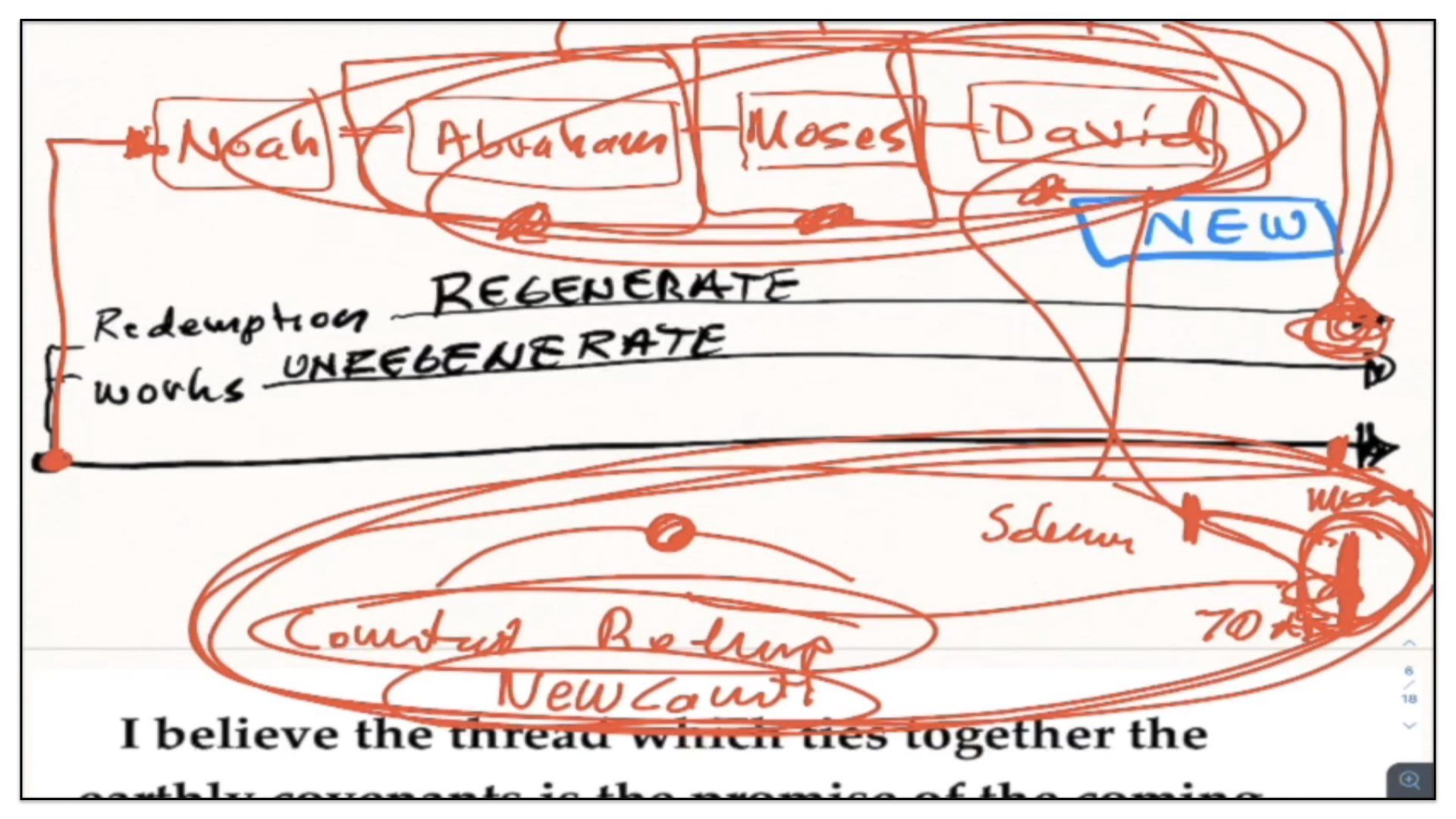
Well, I perhaps have jumped a little further ahead than planned at the end of this study, but that gives you a little insight into some of the upcoming studies where I’m going to be explaining more fully the end of the Jewish people as a nation and God’s explanation to them of the Covenant of Redemption, which goes by the name of the New Covenant.
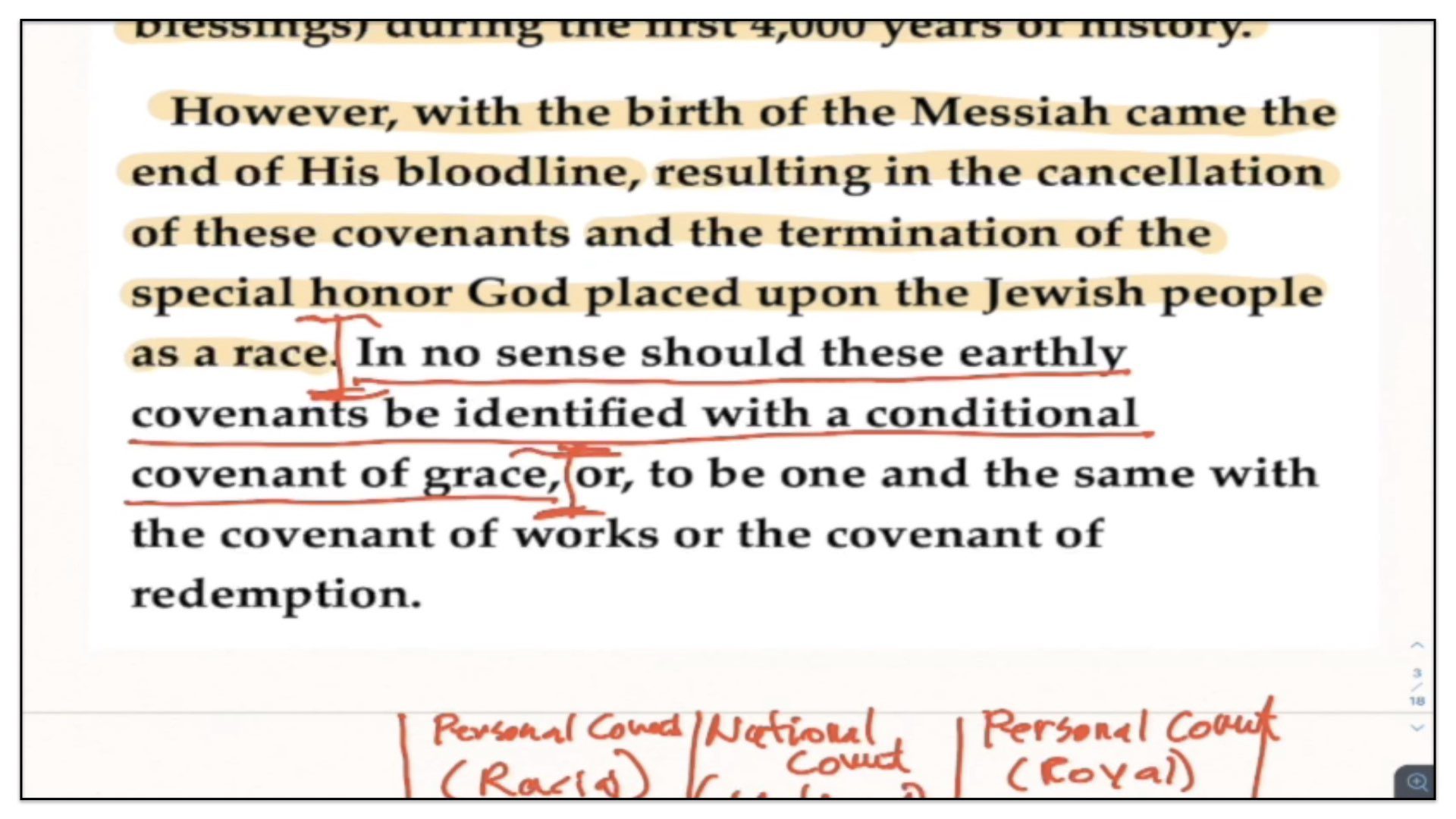
Okay. Well, those are my teachings for you in this study. In our next study—I’ll just take you back up to our main statement, I’ll prepare you for the next study—I’m going to be looking in particular at the statement which follows. Watch. “In no sense should these earthly covenants be identified with a conditional covenant of grace.” That’s going to be the subject of our next study and I want to encourage you to join me in our next study because what I’m about to explain to you regarding a conditional covenant of grace strikes at the heart, really of what distinguishes many of us, from the teachings of the Presbyterians and that of the Reformed Baptists. I hope you’ll come back next time and join me for that special study.
Okay. Well, let me wish upon you every blessing in the Lord for the week that follows and I hope you are able to read the text passages for each of these earthly covenants, compare it to the teachings I brought out to you in this study and I pray the Lord will richly bless you in your pursuit of truth through His Word. Until next time, God bless.
Jared Smith served twenty years as pastor of a Strict and Particular Baptist church in Kensington (London, England). He now serves as an Evangelist in the Philippines, preaching the gospel, organizing churches and training gospel preachers.
Jared Smith's Online Worship Services
Jared Smith's Sermons
Jared Smith on the Gospel Message
Jared Smith on the Biblical Covenants
Jared Smith on the Gospel Law
Jared Smith on Bible Doctrine
Jared Smith on Bible Reading
Jared Smith's Hymn Studies
Jared Smith on Eldership
Jared Smith's Studies In Genesis
Jared Smith's Studies in Romans
Jared Smith on Various Issues
Jared Smith, Covenant Baptist Church, Philippines
Jared Smith's Maternal Ancestry (Complete)




